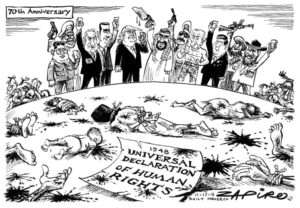A Subject of Public Interest.
Having completed my undergraduate degree,
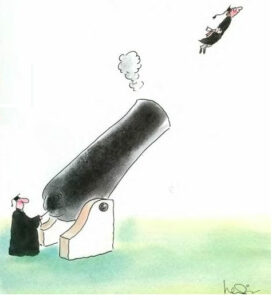
I was able to breathe more easily and devote time to the growing anti- war movement. I wanted dissent such as mine to swell from a marginal position into a mass movement, the aim being not to win or lose it but to end it. In 1967 I organized a Teach-in to thrash out the whys and wherefores of the war in Vietnam.
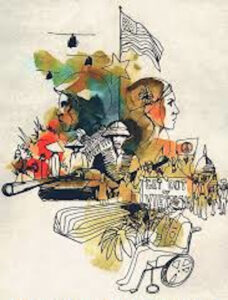
To sort out the facts from the fiction. I lined up six speakers from differing viewpoint to argue for and against Australia’s intervention . I trudged around the campus, around the town and around Tamworth the closest city, canvassing the blocks, distributing leaflets, knocking urgently on doors, getting opinions. Never giving up after the occasional one was shut in my face and swear words scattered. Every war creates a war hysteria. People become superpatriotic. In such times some people don’t want to hear their government or their country questioned.
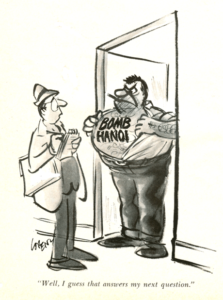
I said to one burly man who had opened his door to me, ‘Have you seen the latest Four Corners documentary about the war in Vietnam.It puts forward lots of reasons not to be there. He replied, ‘I’m a veteran of the war in Korea. ‘We should be fighting there.I’m against communism,socialism and anarchism.’
His elderly father who had shuffled along stiffly behind him joined in, saying, ‘I don’t really care about these ‘isms’. My joints are too swollen.I’m more concerned about rheumatism.’
Some folk didn’t even know the war was going on or where Vietnam was.
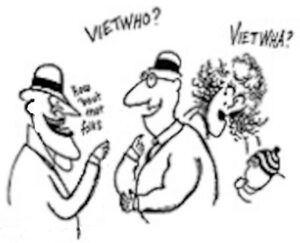
I asked one woman coming along the narrow passageway from a battle axe block of flats. ‘Have you seen what’s going on in Vietnam?’
She said, ‘I live down the back. I don’t see anything.’
I picked up how to make the case in different ways, explaining what was leastways in everyone’s self-interest. The hip pocket.
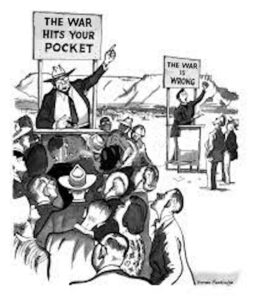
In any war, it is very difficult to talk about peace. I put up posters I made to advertise this event. I illustrated these with arresting Goya-like photographs of this asian Golgotha.

I cut them from a Penguin special, drawing on the work of photojournalists with one eye on survival and another eye on producing strong, truthful images with a narrative. Striking images that would retain their power in the public imagination through the years to come. Ones too discomforting to make it to the print media, not as fleeting or as confusing as those of the moving image. The ones they don’t put on recruitment posters. Villages smashed, children fleeing, babies scorched while fire rained inexplicably from the sky. Ringing out “Danger!”, ringing out “Warning!”The images of this showed the mismatch of American soldiers in a place they didn’t belong.
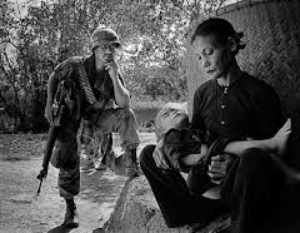
On television screens and magazine pages around the world, photographs told a story of a fight that only got more confusing, more devastating, as it went on. Blowing the lid off this conflict, they powerfully affected attitudes toward it and the protests against it. They created an instant proximity to what was going on.
Open to Debate.
I had to liase with Zelman Cowen to discuss the event as well as an upcoming demonstration.I was heartened to hear beforehand he was approachable, likely to be intrigued by what he could learn from a conversation and delighted in communion not only with the scholarly but with the involved.Moreover he had a reputation for being fully committed to the rule of reason,the right to privacy and the principle of universal human rights.
Having brought to the campus a personality in no way lacking in appreciation of its own worth, he had the assured courtesy of a wise,experienced man.While he had no reticence in urging his own opinions, I found him both respectful and willing to abandon his point of view, if its weakness could be shown.
‘Allan, we have to uphold the values of civil,tolerant society. The right to assembly and expression is fundamental to a healthy democracy. Much ink has been spilt over the extent of this right. In particular, opinions differ on how the right balances against other rights such as the protection of person and property, as well as security concerns. As seen in this discussion, protests can escalate into violent confrontation. ’
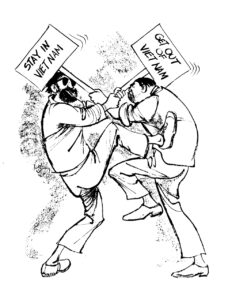
‘Your point is well taken, ’I assured him, ‘from our part no muss, no fuss. ’
‘Now that’s over we can discuss the debate. But first some tea. ’
‘ L’chaim’, I said, raising my cup upwards. .
‘Who’ll be the speakers?’ he asked.
‘One of those who has agreed to speak in support of our intervention is Peter Samuel, the journalist from “The Bulletin”. Amongst those speaking against will be Russel Ward, ‘The Australian Legend, don’t you know, ’I said referring both to his book but also to the man.
‘Ah, Dr. Ward, now there’s a most eminent historian for you, ’ he said, tapping his thumbs on his chair, then stretching behind him to retrieve his copy from his bookshelf. Zelman had a remarkable ability, when a book came into the conversation, to find its place in his vast library almost instantly. ‘I’ve only had time to skim through it but I feel this book speaks about something deep inside us’, he said’, crossing his arms, tilting his head back and gazing thoughtfully into the middle distance, taking long pauses as he formulated measured and well constructed sentences. ‘Our idea of ourselves. Dr. Ward writes and talks about the national character like nobody’s business. ’
‘He smashes it. He has helped many australians better to understand themselves, ’I said.
‘How do you think he sees it?’ he asked, knitting his brow. ‘What with one thing and another, I don’t have enough time to read everything I want. ’
‘He sees it not, as was once held, something inherited, nor on the other hand a figment of the imagination of poets, P. R. men and other daydreamers. It is a people’s idea of itself. ’
‘This has often been romanticised or it’s truth stretched, don’t you think?
‘ Yes, but it’s ridgy didge. It connects with reality. It has sprung from people’s experiences and colours their ideas of how they ought to behave.
‘What qualities does our loud and lively historian attribute to them?’
‘Those that spring from Dr. Ward’s character are mateship and the “fair-go” notion, egalitarianism, and a standalone streak. Many feel his or her view of the self-mocking inevitability of life is peculiarly Australian. Their view is an open, bluff, cheeky self confidence made tolerable and even endearing by the ever present streak of sardonic self mockery , combined with the innocent belief that others, by and large, were as well meaning as oneself. This stereotypical Australian was created by the life experiences of many thousands of convicts and bushmen and recorded in the songs and yarns they passed on to each other. Nurtured by the convict experience, these were enhanced by the proud, healthy currency lads and lasses. ’
‘As fit as mallee bulls-and cows’, suggested Zelman,adjusting his cufflinks.
‘They were chipper, assertive, and more optimistic about the future than the English-born old lags who gave birth to them. ’
‘There was more openness in the new social environment that was created here. Was this the result of of necessity or idealism?
‘A mixture. In the England of the industrial revolution, class, religion and geography were all grounds for discrimination against the mass of people. In contrast the colony of NSW, in order to survive and prosper, needed to reward ability, pragmatism and energy from wherever it emerged. ’
‘From where exactly did it emerge?
‘It emerged from pastoral workers and shearers, the bushrangers and the Anzacs who reasserted this ethos. ’
‘‘Game as Ned Kelly” the people would say, ‘game as Ned Kelly” they say it today’, said Zelman.
‘Heroism in Australian popular culture is almost always represented in terms of the male worker subordinated to the power of capital or the state. Like Ned he abhors officiousness and authority, especially when these qualities are embodied in military officers and policemen. This worker is a very hospitable man, ’ I said, pulling the tray of biscuits laid out towards me, ‘and will stick by his cobbers in good times and bad even if he thinks they’re wrong. ’
‘I couldn’t have said it any better myself. The loneliness and hardships of outback life taught us the value of co-operation and brought a more communitarian or collectivist outlook’, said the V. C.
‘If only this attitude could be found in force more often among our leaders’, I said.
‘ Ah, but it can’, said Zelman. ‘We can trace back this cherished outlook of giving every last one equal worth and sharing equally to Governor Phillip’s day. In 1788 he ordered that the limited rations in the starving settlement be shared equally by everyone regardless of rank. The effect of this on those paying their debt to society must have been to win their respect. In issuing that enlightened order, Phillip capsized every expectation of the class-ridden society from which the colonists had come.He made it as clear as clear as burning daylight that the humanity of the most lowly convict was as important as his own. By this, he conferred value on the prisoners in their own eyes as well as others.
The significance they placed on Phillip’s decision can be judged by how entrenched it became. The convicts made it the pattern for how Australians were expected to relate to each other. ’
‘ It’s accepted many of the convicts transported for’ their country’s good’ did so for petty misdemeanours’, I said, lifting artfully a pen from the V. C. ’s desk and secreting it in my pocket. ‘. Wouldn’t the knowledge that they were sharing with some real nasty felons have proved rather unpalatable for some?’ I asked, putting the pen back on the desk.
‘The British government sent sparse information here about its transportees. For over thirty years, colonial authorities managed the penal colonies with little or no information about the prisoners’ crimes. They knew as much-or as little- about these, ethnically their own, as about the indigenous people already living here. This slurrying of hardened felons with those responsible for small time crimes created many problems. ’
‘What information did they send to the gulag, Professor?’
‘At first, only the date of trial and length of sentence was sent. Later the convicts’ occupations were added, and their age and appearance. Details of their crime were not provided until the mid-1820s. In the vacuum, a culture developed here of judging a man or a woman by their character and behaviour on the spot rather than by their background. Judgment by what you saw suited the prisoners perfectly. ’
What about since the first settlement?’I asked.Do you think this culture has been maintained?’
‘This popular way of judging people came to my attention when I learned about the experiences of men interned as enemy aliens during the War. They had been shipped to Australia on the Dunera.Although officially deemed to be ‘enemy aliens’,their guards saw through this like a shot and treated them with the same respect they would their own comrades.They were greeted with a ‘g’day mate’ and their welfare was asked after.
There are many versions of a story in which a soldier on the train to the camp at Hay asks an internee to hold his rifle while he rolls a cigarette. In some versions the guard goes on to teach the internees how to roll their own cigarettes; in others he isn’t having a smoke at all but is off to the toilet.
‘And what about that custom of sharing and treating each other as equals.Did that carry across into the armed forces?’
‘This practice of sharing resources regardless of rank is well documented in war time. Tom Uren witnessed this on display among Australian men in Japanese prison camps during WWII. ’
‘Do you think we see this same influence today?’I asked.
‘ We can. While unemployment today is minimal, there is community consensus that our government should always provide a ‘safety net’ for the less fortunate.That they should be regarded as one of us. These qualities in our society are not accidental. They arise from our past experience.
‘ Where did Dr. Ward, the scion of a comfortable middle class Adelaide family take on these values of the wild colonial boy?’ Zelman asked me,tapping a pencil on his desk.
‘All around the country, Professor’, I said, resting my ankle on my knee. As a lad, this crow-eating, banana bending, sandgroping son of a Methodist headmaster lived in a number of locations, ’I said, using the names given to inhabitants of South Australia, Queensland and Western Australia. ‘In the late 1930s’ he spent several holidays travelling in the bush and earning his damper as a casual wheat lumper, miner’s mate, road labourer and roustabout. His hands raw, he found the voice of ordinary people, where he started to interpret history ‘from below’. When it came to casting around for ballads, he learned more and more about the working conditions, lives and outlook of the people who sang them.
‘According to the myth he talks of, ’ I said, taking my elbows off his desk, ‘the “typical Australian” is “a practical man, rough and ready in his manners and quick to decry any appearance of affectation in others. ’Holding back the urge to slurp my tea from the saucer, my childhood memory of Colin Roberts was refreshed.
‘He is a great ‘knocker’ of tall poppies, ’remarked Zelman, ‘Individuals who, on the basis of unwarranted self-adulation, itself a consequence of conspicuous success, have amassed fortune, rank, distinction or fame and flaunt it. ’
‘Big knobs who bignote themselves- who are up themselves’, I suggested, getting into it. ‘They see themselves as the ant’s pants. ’‘They’re having themselves on. They think that they are above the law, ’ added this professor of law.
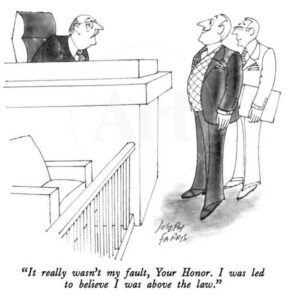
‘They’re actually beneath contempt. ’They engage in bootleg behaviour, only to find that, by and by, the law catches up with them as well. Too big for their boots- with tickets on themselves, all these individuals attract the envious notice or hostility of others who often held them in contempt and try to bring about their downfall or ruin”.
‘Those who get to big for their britches will be exposed in the end. Unless, as in the case of our sporting heroes, they are distinguished by physical prowess’, I proposed.
‘ Of course Australians enjoy, appreciate, admire and aspire to success and achievement in all fields—provided that hole in one doesn’t go hand in hand with egotistical behaviour and bragging ‘
‘The patter of tiny feats.’
‘Working people-‘cause that’s who we’re talking about- mistrust anyone who breaks from the pack and places themselves above others. That’s why men as a general rule prefer to sit beside their taxi driver here. Some see this egalitarian ideal as a bland hymn to mediocrity. I see it as a positive thing. It expresses our great reluctance to defer to authority figures . It encourages us to reject the class system and a society predicated on the worship of money. It also expresses the average Australian’s mockery of the desire to impress. It has made us ill at ease with the bodgy idea that success implies superiority. The Australian ethos is to be self-effacing about our success and humble about our achievements. A powerful check on shifting values, it’s a great leveller.
‘On the frontier all could be fixed with a little practical ingenuity. The aussie is a great improviser’, Zelman continued, ‘ever willing ‘to give anything a burl, but … content with a task done in a way that is ‘near enough’.
‘To quote one of our favourite bush songs’, stringy-bark and green-hide would never fail yer,’ I said.
‘Though capable of great exertion at a pinch, he normally feels no impulse to break his back without good cause. He gambles heavily and often, drinks deeply every now and again , swears hard and consistently.’
‘He might see a case of Tourettes as a gift,not a curse.’
‘Of course he may just be demonstrating the richness of the Australian vernacular. ‘
‘Who called the cook a bastard? Who called the bastard a cook? I said , bringing up a favourite rhetorical remark passed in disparagement of the cook’s deplorable efforts’.
‘Complementary, but scarcely complimentary’, commented Zelman, ‘You had to be careful talking like that in the army. Cooks expected their culinary efforts under difficult circumstances to be appreciated.
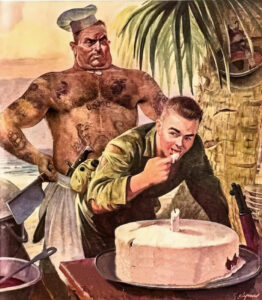 ’
’
‘Dr. Ward used this shibboleth not just with its negative and neutral connotations but also it’s positive. As a term of familiar affection. He told me a clever yarn about an incident in the infamous ‘Bodyline’ cricket Tests of 1932-33. The story goes that the much-despised English captain, Douglas Jardine, nipped into the Australian dressing room to whinge that one of the Australian players had called his prize fast bowler, Harold Larwood, a ‘bastard’, whereupon the Australian skipper, who was a very proper Victorian headmaster called Bill Woodfull, turned to his team mates and asked: ‘Which one of you bastards called that bastard a bastard?’
“This bastard, ’ Zelman went on, ‘is a ‘hard case’, sceptical about the value of religion and of intellectual and cultural pursuits generally. He believes that Jack is not only as good as his master but probably a good deal better . ’
‘Why is that?’ I asked.
‘Why not?
“Professor Cowen, may I ask you a personal question? why is it that whenever you ask a Jew a question, he answers with another question?
“Who told you that?”
‘It’s just something someone told me. So here’s another question, Professor. How come Jewish people always have a smart witty answer on hand when asked about their ways?’
‘Practice, practice, practice. On the subject of questions, don’t you hate it when someone answers their own questions? I do. Now listen, Jews are not so different to other Australians.’
‘I guess I won’t find that out until I fall in love.’
‘Haven’t you heard the saying-when you’re in love the whole world is jewish. Is there any truth in it ?’
‘If so it will put any Palestinians off from falling in love.’
‘ Some say jews readily toe the official line. Are they any more conformist than others?’
‘They can be fiercely independent individuals who hate officiousness and authority . ‘
That’s Einstein for you.’
‘Exactly. Can’t you say the same of a typical Australian?’
‘Can I what? The typical Australian is very hospitable, ’I said, ‘and will stick to his mates through thick and thin, even if he thinks they may be in the wrong.”
‘ Dr. Ward, it seems to me, identifies the ideals of the common people’, Zelman said. ‘When do you think this Australian bush legend culminated?’
‘ Dr. Ward argued that it was completed the in the 1890s, after native-born white Australians had become the majority of the population . Literacy had brought the city and country closer together, with Lawson and Paterson it’s bards and scribes romanticising the bush ethos. The ethos was propagated by the strengthening labour movement. There have been objections, of course, to his portrayal of the typical Australian after the book was first published. ’
‘‘Some might cite alternate sites of Australian-ness, ’Zelman said. ‘The beach, the sporting field and the city. Morever even though it was based on the ‘work and bust’ pastoral worker, the fact was that most Australians lived in cities. Many of whom were smallholders and tradesmen, born of free settlers. Their qualities were just as likely of a different kind-anglophile, racist, and aiming for suburban respectability — a piano behind the lace curtains in every bay window. These were the values that would come to prevail in the latter half of the 19th century. Trashing the reputation of the early settlements, it’s proponents created a grotesque template that has been accepted as fact. They portrayed convicts, those who built our social and physical infrastructure, as obscene and depraved. It became untenable to identify oneself as a convict or someone with convict connections.
For example, in 1852, Reverend John West, who led the campaign against transportation, wrote a history book that is still influential. He established an image of our convict era as a degraded system of ‘revolting severity and prisoners debased by habit’ claiming that it left ‘a class embittered by ignorance and revenge’.
Then there is that muted moiety of the Australian population-women. Their characteristics were, to say the least, muted in Ward’s very masculinist text, according to some. ’
‘Dr. Ward says the Legend does not purport to be a history of Australia, or even an explanation of what most Australians are like, ’ I said. ‘Rather, it seeks to explain the development of the Australian self-image. As his starting point, he records how the bushman is enshrined in our culture as the bearer of the national mystique. He says it shows that the ethos of workers in the bush had a disproportionate influence on that of the whole nation. Not all Australians acted in this spirit , of course, but most liked to identify with the legendary set of attitudes. And of course some take them ‘cum grano salis’. Everything they practise flies in the face of them. How do we explain the flying of the mateship flag on Australia Day during bushfires and floods, while keeping it firmly furled from Eurasian migrants? How does egalitarianism rate when a corporate executive can earn many, many times more than a labourer? And getting back to the subject of our upcoming debate, how independent minded are we when Australian foreign policy pratfalls into step with that of the United States. Where we bend a colonial knee not to the old British Empire b ut to the new Pax Americana?’
‘The debate won’t descend into a slanging match, I trust. Be tough in the clinches on your issue but gentle on our campus. People can get worked up at meetings like this. Personally I remain strictly neutral over the matter though I believe Australia should find a more independent voice in Vietnam. I believe a debate about this conflict should be ringing out in every town hall throughout the land. However I’d rather an active student body that protests and gets involved and, because they’re students, makes mistakes and learns, because that’s what it means to be a student. Just make sure all the speakers are given a fair crack of the whip. ’ said Zelman. ‘While this matter raises passions, you don’t want anyone raising points of order of losing their block unecessarily. Our civil liberal society depends on shared values and rules.It’s apparent this war is starting to tear the social fabric in other countries and threaten their fragile consensus.’
‘No drama, Prof’. I assured him. ‘We won’t let you end up like Clerk Kerr or LuPing. Caught in any crossfire. At most we’ll have a small war of words. We’re not aiming to stir the possum.’
‘As for your demonstration, keep in mind that although the right to political assembly and expression is fundamental to a healthy democracy, there are differences in opinion over the extent of this right. In particular, opinions differ on how the right balances against other rights such as the protection of person and property, as well as security concerns. Protests can escalate into violent confrontation.’
‘That definitely won’t be the case,Professor Cowen,although I can’t speak for those who’ll be marching on the other side. Thank you so much for your time and consideration. Shalom aleichem.’’
The Teach-in was nearly a non-event as the three who were to speak in defence all cancelled at the last moment.
‘Maybe they thought they would be up against a Maoist “shock force” “bombarding” them with a bad rap and subjecting them to an all night interrogation session. ’I said mockingly to Russel.
‘Conservatives tend to believe their own constructs. These guys might think that anyone who questions our ‘shoot first, talk later’ government is a raving loony. However more likely they realized the weakness of their ‘watertight’ argument when challenged with facts. ’
Their move was very instructive to me of the way in which consent is manufactured. The debate was saved by the good grace of the Professor of Botany, Le Gay Brereton who went in to bat for the government. At the end, swayed by the arguments presented, he admitted that he had had a change of heart .
Blowin’ In The Wind.
“Yet Freedom! yet thy banner, torn but flying, Streams like the thunderstorm against the wind.”
Byron.
That year I helped organize a demonstration against conscription and war, rallying as many numbers as possible to our banners.
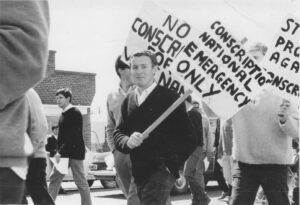
‘Any pointers you can throw my way, Russel?’ I asked. He gave me this advice when marching: ‘Spot The Spooks. Put on a smile when you see strange cameramen clicking . Show them your good side. They’re on the sly for Brigadier Spry. ’
As we marched some passing drivers stuck their hands out the window of their cars and joined us in making the “V” sign for peace. Others, driving with their headlights on in support of the war, cursed us. At one corner, a policemen made the “W” sign for war. They were behind the counter demonstration making it’s way behind us.
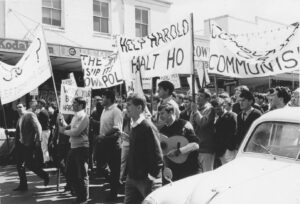
Made up of friends as well, I was hardly in a position to cast a stone at them.
I was stepping along with my mate, John Hadfield, a Bob Dylan devotee. We were carrying a banner that read:’Stop The War Against Vietnam Now!’We had some difficulty holding it as a strong squall built up.
‘The Answer Is Blowin In The Wind’, I said, referring to this anthem, carrying the moment of its own time, posing a series of rhetorical questions about peace, war and freedom.‘ But Dylan doesn’t offer any answer. ’
‘ This was aforethought, ’said John. He wasn’t writing about any issue in particular. He doesn’t like to be pinned down to any ‘ism’ or to be typecast. In his view people should ascribe to this song whatever answer they wish, apply it to whatever issue they want to. The answers are always out there but its not easy to find. ’
‘When it comes to this war, it took me a while to work it out, ’I said.‘What inspired his lyrics?’
‘He may well have taken the theme from a passage in Bound for Glory. He discussed this with the song writer at his hospital bedside.
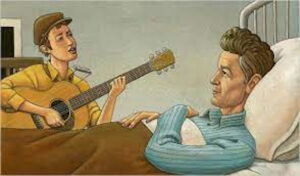
Woody Guthrie compares his political sensibility to newspapers blowing in the winds of New York City streets and alleys. ’
‘Everyman and his dog seem to have covered this spiritual’, I said. ‘Even Cliff Richard has a version. It’s on his album “Kinda Latin”.
Meanwhile each strong gust threatened to pick it up our banner and blow it away.
‘How do we get around this?I asked.
‘The answer is blowin in the wind’, he replied. All we’ve got to do is cut a few holes in the fabric, ’he said, taking out his pocketknife, cropping straightforwardly away, ‘—and Bob’s your uncle. ’
‘Uncle Bob’s a good man to have around’, people were saying. The legend of ‘Bookshop Bob’ had gotten around. The fact of the matter was that ‘Bookshop Bob’ was barely a decade older than me.
By all means this, my first go at helping organise a lusty demo, brought some passion to what was normally a very quiet and un-political campus. I prayed that it would influence the political windsocks, drifting with the prevailing breeze, to blow in the same direction as us. I prayed that the hard rain bucketing down would ease.
Shades of Gray
Stripping away the façade of this policy, much of it covert, was an exercise which led to my growing awareness that issues are not clear cut, not black or white. As mentioned, I saw the darkness fall on Camelot and twigged why Castro became convinced to take the measures he did. Details of US government conspiracy to torture and assassinate – practices most people would believe when carried out by the Bush administration – were not fully disclosed and scrutinized until the following years.
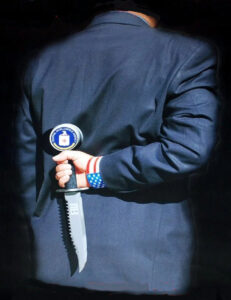
For their short remaining lives the Kennedy brothers, confronted with the bruising reality of jungle conflict, were forced to soften their Cold War rhetoric.
Domestically likewise, Jack and Bobby would finish up taking a more independent liberal direction after encountering prejudices and inbred hatred of blacks against which that of Irish Catholics paled. This would force the whole Kennedy clan, even its patriarch, no hand wringing sob sister by any means, to reassess its positions. Joseph Kennedy would excommunicate the vainglorious Spellman. He took great umbrage at the prince of the Church, fearful of losing the prestige of being the nation’s most prominent Catholic , ditching Jack and endorsing Nixon.
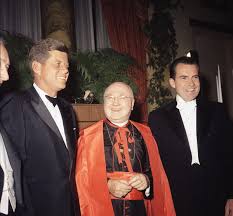
The Cardinal believed Nixon would push harder for funding for parochial schools, sexual morality and action against Communism.
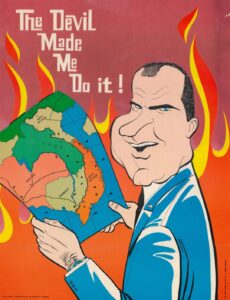
In Congress Jack, who had inveighed vehemently against Communism, favoured aid to East European Communist states, including Yugoslavia, a move opposed by the US bishops who failed to appreciate his flexibility. So much for the claim by anti Catholic zealots that the nation’s course would be guided by dog – collared “Romish’ clerics whispering into the presidential ear. Rather it would be the Presbyterian Hoover – the honorary police chief of Havana – breathing down the necks of the president and his brother, the Attorney-General, warning them not to go too far.
Justifiably So.
“Injustice anywhere is a threat to justice everywhere. We are caught in an inescapable network of mutuality, tied in a single garment of destiny. Whatever affects one directly, affects all indirectly.”
— Martin Luther King Jr.,
“Letter from a Birmingham Jail,”1963.
Evermore socially conscious I took it upon myself to encourage those who championed front and centre, either through their political position or through their celebrity status, the principle of universal civil rights in every sense of the word.. Following their words carefully, I strove to echo their cri de coeur for equal opportunities afforded to all. I saw the role of government to be to remove inequities such as low wages, poor education, gender inequalities, and a shorter life expectancy for some. As citizens I feel we should act as if we are free and do right by others as we want them to do by us. As a student, I saw myself as one with the makings of an intellectual, one in training, but not someone standing apart from the world. I am a part of it. And I believe everyone must always be part of their surroundings. I do not trust literature students who only read the literary pages. I do not trust financial people who read only financial pages. A financial wizard needs to read the arts pages, and a writer needs to read the political pages in order to live in the world in which he or she functions. I had to become an activist because I’m a human being. And I am, as the Greeks have said, a political animal. I live in the fabric of a society that forces me to partake in whatever it is that the society presents me with. And I cannot divorce myself from it. I cannot say to myself I’m a lofty person engaged in some mythical remove, and I’m not, because I’m part and parcel of everything that there is.
A passionate concern for the state of the world.
Intensely interested in the world about her, Sybil Thorndike managed to find time to work diligently for a number of causes, including trade unionism, women’s rights, the peace movement and the the anti-colonial ethos.
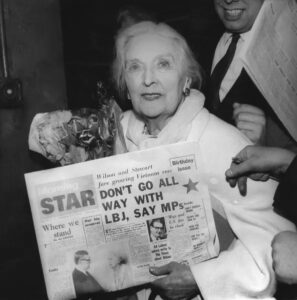
She supported the work of Krishna Menon, a major architect of Indian foreign policy who facilitated international diplomacy and resolutions in situations such as the Suez Crisis. She supported the work of Dag Hammarskjöld, the UN Secretary General who played a major role in mediating the crisis. She discussed this issue with them.
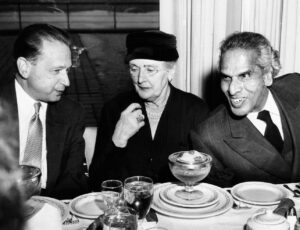
She was at home with workers as she was with aristocrats.
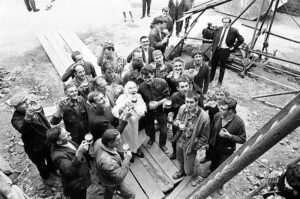
I thanked Sybil for taking up the cudgel for the workers during the General Strike of 1926.

Their actions, to improve their conditions and defend their right to work, stopped the first run of ‘Saint Joan’.
She saw beyond her own immediate personal needs. Her political consciousness was sharpened during World War II when she toured Welsh mining towns with their proud and strong working class culture.
Paul Robeson, the son of a runaway slave, had primed her for this tour. They were working together on ‘Othello’.
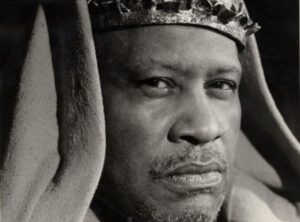
He told her how the miners from Wales had so inspired him. in the winter of 1929, Paul had been performing in Show Boat in London.
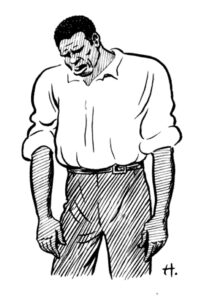
Two of the musical’s song lines —“Let me go way from de Mississippi, Let me go ‘way from de white men boss” — were Paul’s call for black identity. The passion with which he sang them roused his audience just as it had roused me at the Sydney Opera House. Paul was returning from a matinee performance of the show when he heard male voices wafting from the street. He stopped, startled by the perfect harmonisation and then by the realisation that the singers, when they came into view, were working men, carrying protest banners as they sang.
By accident, he’d encountered a party of Welsh miners from the Rhondda valley. They were stragglers from the great working-class army routed during what the poet Idris Davies called the “summer of soups and speeches” – the General Strike. Blacklisted by their employers after the unions’ defeat, they had walked all the way to London searching for ways to feed their families. The marchers were stunned when this huge African American stranger in formal attire, incongruous next to the half-starved Welshmen in their rough-hewn clothes and mining boots, attached himself to their procession.
Leaping on to the stone steps of a building they stopped at, he sang Ol’ Man River and a selection of spirituals chosen to entertain his new comrades but also because sorrow songs, with their blend of pain and hope, expressed emotions that he thought desperate men far from home might be feeling.
Paul was now aware of the labour movement, and began to pay attention to its victories and defeats. His frequent visits to mining towns in Wales were part of that newfound political orientation.
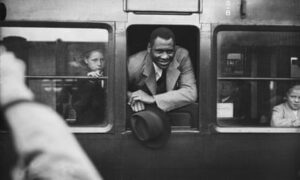
His interactions with Wales were shaped by the violence of mining life: the everyday hardship of long hours and low wages, but also the sudden spectacular catastrophes that decimated communities. Paul offered his fees for a concert to the fund established for the orphans and children of the dead in a colliery disaster. – an important donation materially, but far more meaningful as a moral and political gesture. He showed an impoverished and struggling community – people who felt themselves isolated and abandoned — that he cared deeply about them.
This is why Wales remembered him. The continuing affection for Paul was more than a recollection of generosity. The Welsh sensed the relationship was reciprocal, that he was deriving something from their friendships, from seeing how people in the mining communities supported one another and cared for one another. He later said he learned more from the white working class in Wales than from anyone.
He sang together with their choirs.
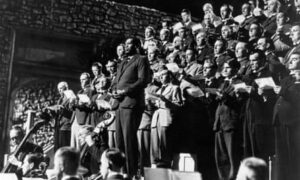
While in their churches they marvelled at this worshippers’ command of the black vocal tradition, he was confronted by the harmonic power of Welsh choristers. Paul, of course, had made that comparison many times. Both the Wesleyan chapels of the Welsh miners and the churches in which he’d worshipped with his father were, he said, places where a weary and oppressed people drew succour from prayer and song.
His film The Proud Valley rested on precisely that conceit. In it, Paul played David Goliath, an unemployed seaman who wanders into the Welsh valley and is embraced by the miners when the choir leader hears him sing.
The cooperation mandated by modern industry tended to break down the prejudices that divided workers, especially the stigma attached to race. That was the point Paul dramatised in The Proud Valley, in which the solidarity of the workplace overcomes the miners’ suspicion about a dark-skinned stranger. “Aren’t we all black down that pit?” asks one of the men.
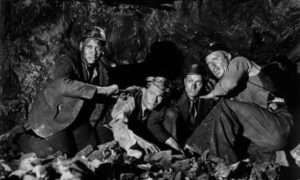
“It’s from the miners in Wales,” Paul explained, “that I first understood the struggle of Negro and white together.”
Throughout the 1930s, the analogy between African Americans and workers in Britain ,and especially Wales, helped reorient Paul, both aesthetically and politically, after his disillusionment with the English establishment. He might have found refuge in London from the impossible dilemmas confronting a black artist in America. But he’d learned to see respectable England as disconcertingly similar, albeit with its prejudices expressed through nicely graduated hierarchies of social class. To friends, he spoke of his dismay at how the British upper orders related to those below them.
He was ready, both intellectually and emotionally, for the encounter with the British labour movement. His contact with working-class communities in Britain provided him with an important reassurance. He received a letter from a cotton-spinner during one of his tours. “This man said he understood my singing, for while my father was working as a slave, his own father was working as a wage slave in the mills of Manchester.”
That was in northern England, but he experienced a similar commonality everywhere, and it pleased and intrigued him. If the slave songs of the US were worth celebrating, what about the music emerging from other oppressed communities? What connections might the exploration of distinctive cultural traditions forge between different peoples?
Star or not, it was impossible for him back home to be shielded from institutional racism. He’d signed up, with great hopes, for The Emperor Jones in 1933 – the first commercial film with a black man in the lead. But the process played out according to a familiar and dispiriting pattern. Paul’s contract stipulated that, during his return to America, he wouldn’t be asked to film in Jim Crow states. The Emperor Jones itself was still very much shaped by conservative sensibilities: among other humiliations, the studio darkened the skin of his co-star, lest audiences thought Paul was kissing a white woman.
In the thirties Paul had reached out to the Welsh miners when his career was at its height. They came back to him at his lowest ebb, almost two decades later, at a time when all he’d achieved seemed to have been taken from him. In the midst of the cold war, the FBI prevented Paul from performing at home. He’d proclaimed his sympathy for the Soviet Union ever since the mid-30s. That leftism now made him a target. He became the most blacklisted performer in America, effectively silenced in his home country. Worse still, the US state department confiscated his passport, so he could not travel abroad. He was left in a kind of limbo: silenced, isolated, and increasingly despairing.
Paul’s time on earth was spent in the pursuit of justice for all human beings and toward the enlightenment of men and women the world over.
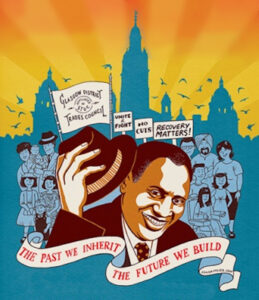
In 1934, passing through Germany on his first of many visits to the Soviet Union, he was the object of racial epithets from Hitler’s storm troopers, and he was angered.
In the late 1930’s he went to Spain to sing for the Republican troops and for members of the International Brigades who were battling the Franco revolt, which was backed by Hitler and Mussolini.
“I saw the connection between the problems of all oppressed people and the necessity of the artist to participate fully,” he said.
In Moscow, where he was feted, he was impressed, he said, by the absence of racial prejudice among Soviet citizens.
He was entranced by what he saw. That his own country treated black men such as him so abysmally made the superficial equality of the stalinist system very alluring. Yet his understandable anger at the United States blinded him to the many injustices of Stalin’s murderous regime. His opposition to Western imperialism in Africa blinded him to the poor Soviet treatment of national minorities and curtailments of rights in Eastern Europe.
“It is personally painful to me to realize that so gifted and forceful a man as Robeson should have been tricked by his own bitterness and by a total inability to understand the nature of political power in general, or Communist aims in particular, into missing the point of his own critique,” wrote James Baldwin in 1948.
Back from Europe Paul stepped up his political activity in the U.S. by leading a delegation that urged the Baseball Commissioner to drop the racial bars in baseball; and by calling on President Truman to widen blacks’ civil rights in the South.
Starting in 1948, Paul was questioned several times by Congressional committees.
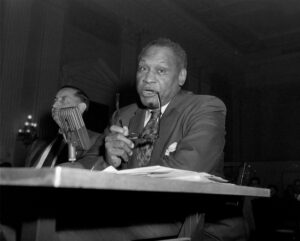
Although he denied under oath that he was a Communist Party member, affiliation with it was generally imputed to him because he proudly performed for so many trade unions and organizations deemed “subversive” and for so many causes promoted in left wing periodicals.
He uniformly declined to answer under his Fifth Amendment rights. He maintained privately, however, that he was not a member.
After his right to travel was eventually restored in 1958 he came to Australia among other places and thrilled yet another audience including myself with wonderful voice and passion of his.
Here he encountered another country where black people were discriminated against as explained by indigenous activists on his arrival.
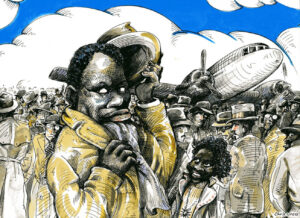
Australians Together.
An astonishing 99. 77 percent of Australians ticked the Yes box in the most successful referendum in1967.
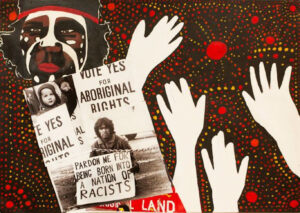
As I ticked mine, I thought of a fellow student who revealed to me his big heartness,’I favour racial equality,but only at such time the aboriginal shows he’s ready for it.They don’t seek to better themselves.Coming from humpies They don’t know how to live in a proper house. Give them one and they’ll tear it apart.’
I thought of Zelman Cowen who produced for ABC television the ”yes” case.
I thought of Rose my nanny, and the man who I had encouraged to bring it about. Dr Harold Coombs had been a tireless supporter of aborigines’ rights and pushed for the referendum which recognized aborigines as Australians and allowed the Commonwealth to make laws for them. He was involved in the decision by the federal government to establish a Department of Aboriginal Affairs after the referendum.
He appreciated the fact that we were one of a piece in our concern for getting government to respond positively to demands put forward in this area. He maintained that to ignore aboriginals, Australia would condemn the indigenous people to deepening injustice and the nation to ongoing opprobrium. That so long as they were denied their rightful place in Australian society,we were diminished as a people.
In 1994 he said: “There are signs however that attitudes are changing. Over the last few years, Australians have become aware that aborigines have been badly treated and are anxious that things be improved. However they haven’t got around to thinking it’s our personal responsibility to do something about it. They think it’s up to the government”.
Rose Watley did something about it and found support in local government. She was eventually re-housed in a council house in Gunnedah.
When 400 aboriginal chieftains from around Australia gathered for the Eva Valley Summit near Katherine in the Northern Territory, only one white man was invited – Nugget Coombs. The historic meeting was called by aboriginal leaders to discuss the future of land rights.
I get a sense of the excitement and privilege he must have felt on Australia Day 1998 when one of the biggest gathering of indigenous people ever held in Australia took place in Sydney. Many were dressed according to tribal custom. That they have survived with their pride and dignity is testimony to their outstanding resilience.
One speaker said, ‘For our peoples, this is not Australia Day. For us this is Occupation Day. Many ignorant whites say the number of refugees coming here in boats should get out of Australia. These white boat people, these newcomers, should get out too. ’
Dr Coombs was respectfully called ‘old man’ in many aboriginal communities and dubbed Dhumbul Bapa or ‘short man’, in reference to his stature by the Yolngu people of Yirrkula in the Northern Territory. A prolific writer and researcher, among his many texts was the release in 1978 of the book Kulinma, which means “keep listening” in the aboriginal language, Pitjantjatjara. He was very keen to get the Australian government to take serious the matter of entering into a treaty with aborigines. When he died in 1997 his ashes were laid to rest alongside Yolgnu warriors.
This move to end racial discrimination paralleled that elsewhere where people were treated as poor relations because of the colour of their skin.
On tour in 1928 in South Africa, Sybil Thorndike and her lifelong soul mate Lewis, were shocked to find that blacks were barred from their plays because of segregation. To justify this the old argument given was so comforting; so plausible: ‘One person in that segregated, white audience, might be moved to think, and then to change, by what he or she saw’. Sybil understood it didn’t really work that way.
She and Lewis prevailed upon the theatre management to segregate the theatre itself. In the new disposition blacks would sit in the circle and whites in the stalls!
I thanked former Prime Minister Harold Macmillan for getting at the stiff necked, race-blinded oligarchy in Capetown during his tour of Africa. He saw the apartheid policy as being evil and unjust. Referring to the Parliament in South Africa he spoke of having entered a ’lions den’.
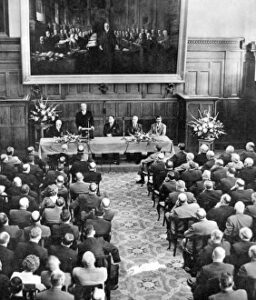
He came to warn of the ‘wind of change sweeping through the area’. He predicted that “peace will come one day, although perhaps after much sorrow and tribulation”. Peace would come between the races, which is a major step forward, not to be overlooked in light of the heightened aggrievement which exists over economic inequalities.
I expressed my gratitude to Senator Morse for supporting the civil rights movement against apartheid in the USA.
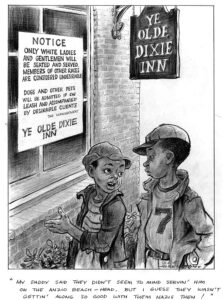
Speaking out against institutionalised racism in housing, jobs and wages, he fought for desegregation in the District of Columbia during a time when this was not popular.
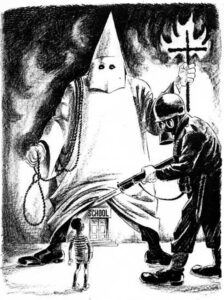
He brought black friends to dine in the Senate. This was a practice unheard of. There was the story of the African dignitary refused service there. He was directed to the servants’ entrance rather than the elevator.
‘But I’m the Ambassador for Ghana,’ he insisted.
‘I don’t care who you are,’ said the restaurant manager, ‘You’re not Ghana be served.’
The question must have invariably been raised in the corridors of power “Guess who’s coming to dinner?”
The chamber’s discrimination was not as crude as that under Jim Crow. It was more like James Crow.
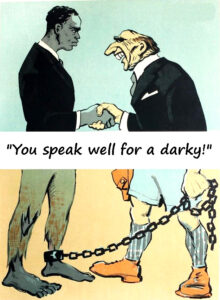
The joke circulated about the waiter approaching Wayne and his first such guest : ‘I’m afraid we don’t serve coloured people here.’ ’Wayne replied, ‘My honourable friend doesn’t eat coloured people anywhere!’”
The honourable friend asked the waiter ‘How can racist policies be justified in this day and age?’
When the waiter had difficulty coming up with the right words, the guest said, ‘Come on, don’t leave me hanging.’
Then feeling some sympathy for the waiter’s embarrassment. he said, ‘Look, don’t worry about it, Waiter, I’d like to order some whitebait. ’
Wayne said, ‘Senator Joe McCarthy dined here last week. I hear he ordered redbait.’ Morse’s inviting black leaders to meetings in the Senate gradually got to dixiecrats.
A case of Southern Discomfort.
I congratulated Benny Goodman for inviting black musos into his formations. He said we need the white keys and the black keys to play together to make good harmony. And that’s what he did. He pioneered the presentation of inter-racial music groups. In the early 1930’s black and white jazz musicians could not together in most clubs or concerts. In the Deep South southern states racial segregation was enforced by the Jim Crow laws.
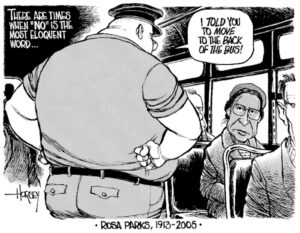
Prejudice in the Deep South ran very deep. The story goes that Benny and Sammy Davis both got on a bus down South at the same time. They were heading to the synagogue for a funeral. The bus driver said to Sammy, ‘Down to the back of the bus!’
Sammy who had converted to Judaism protested, ‘But I’m Jewish.’
‘Get off!’
Benny introduced Teddy Wilson, Lionel Hampton and other black musicians to a wider audience and like Elvis brought black music to its young white elements.
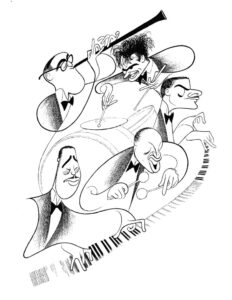
The bands financial success was such that they didn’t need to tour the southern states where his lineup would have been subject to arrest.
One of the clubs they appeared at had a swimming pool. When one of Benny’s players asked if he and his daughter could use it, he was refused. He argued to the management, ‘Look, my daughter has a white mother. Couldn’t she go into the pool at least up to her waist?’
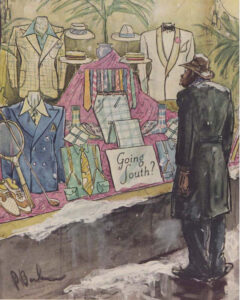
Bernstein the Activist.
I congratulated Leonard Bernstein for breaking down the same barriers in the classical world, and for his defence of personal freedoms. He championed the right to express one’s opinions without censorship, restraint, or legal penalty.
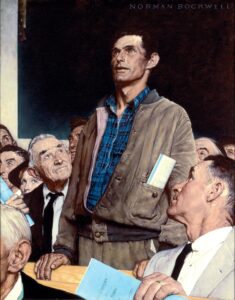
Leonard’s time with the New York Philharmonic which he so promoted saw the introduction of its first African American member.
In 1959 he toured the Soviet Union. The highlight of his visit was his conducting Shostakovich’s 5th Symphony in the presence of the composer. Shostakovich had been lucky to escape with his life earlier when his music didn’t suit the tastes of Stalin. As with the Church and the tritone you could read into it an ideological ban in the guise of a technical ban.”
At the end of the performance, Shostakovich came on the stage to congratulate Bernstein and the orchestra.
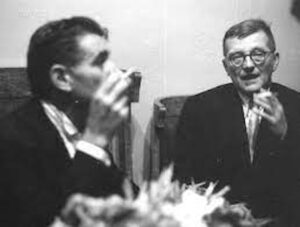
From his early childhood until his death Bernstein was unwavering in his support for liberal causes. He was politically active all his life. As a student in the 1930s, he directed a production of ‘The Cradle Will Rock’, Marc Blitzstein’s opera about corruption and corporate greed, a polemical paean to the labour struggle.
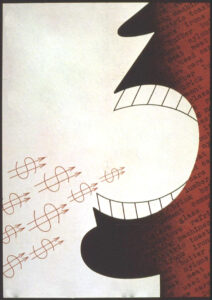
The local police reported him to the FBI.
Not only was Bernstein subject to FBI spying for his support for wartime Russian relief, and post-war support for refugees from fascism, but also for his support for civil rights for African Americans.
He joined with activists like Paul Robeson to protest Spain’s fascist regime. He raised funds for strikers’ families and supported the 1948 presidential campaign of Henry Wallace, who ran on the issues of universal medical care, civil rights, and full employment. Even his wartime ballets Fancy Free and On the Town pushed the envelope, featuring Japanese and black dancers at a time of nearly omnipresent xenophobia and racism.
In 1949, Bernstein was labelled a communist and blacklisted, his music banned by the CBS network and from the movies. Only in 1953, when he signed an 11-page affidavit saying he was not a communist, was he allowed his passport back.
During the late sixties, Bernstein would host meetings at his duplex apartment.

Members of the New York social elite could gather and meet leading civil rights activists. A group of concerned New Yorkers would establish a fund to help with legal expenses and to assist the families of the Panther 21 while the prisoners awaited trial.
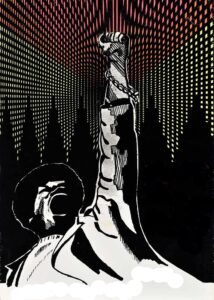
The gathering at the Bernstein apartment was held to raise awareness and contribute to this fund.
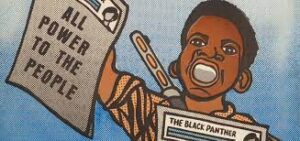
What would be intended as a serious meeting to address a violation of civil liberties became a sorely misunderstood event that led to a media frenzy and extensive personal attacks on the Bernsteins . Lenny was said to be about talking “jive” with the “funky” Black Panthers. For the next few months, the Bernsteins would receive volumes of hate mail, withstood innumerable printed attacks and were harassed all spring in front of their building by picketers from the Jewish Defense League who loudly protested Bernstein’s supposed “endorsement” of the anti-Zionist Panthers.
In response to these revelations, Bernstein issued the following statement:
I have substantial evidence now available to all that the F.B.I. conspired to foment hatred and violent dissension among blacks, among Jews and between blacks and Jews. My late wife and I were among many foils used for this purpose.
The F.B.I.-inspired harassment ranged from floods of hate letters sent to me over what are now clearly fictitious signatures, thinly-veiled threats couched in anonymous letters to magazines and newspapers, editorial and reportorial diatribes in The New York Times, attempts to injure my long-standing relationship with the people of the state of Israel, plus innumerable other dirty tricks.
In the 1980s, parts of Bernstein’s 800-page F.B.I. file were released under the Freedom of Information Act. The contents revealed that for over three decades, the F.B.I. kept extensive records on Bernstein’s political activities, obsessively trying but never succeeding to establish that he was a member of the Communist Party. He never was. In the aftermath of the fundraiser for the Panther 21, the released files now made clear, the F.B.I. had engaged in a methodical undercover campaign to damage Bernstein’s reputation. The angry letters and hate mail sent to the Bernsteins were orchestrated by J. Edgar Hoover’s counterintelligence program. The Jewish Defense League protesters outside the apartment were heavily infiltrated by F.B.I. operatives. And the relentless assault by the press was in part instigated by the FBI’s carefully placed confidential news leaks to their cooperative press contacts.
I was shocked by the frivolous way this civil liberties meeting was reported as a ‘fashionable’ event and found it offensive to all people who are committed to humanitarian principles of justice.
Lenny supported the anti-war activist Daniel Berrigan jailed for his anti-war activity.
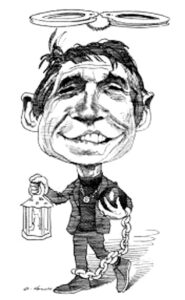
Subsequently Lenny and found himself on the wrong side of not just the FBI but most of the liberal media.
He marched against the Vietnam War, met Martin Luther King in Selma, and supported Eugene McCarthy.
Lenny and his Chilean wife would not only care deeply about persecution in Chile and elsewhere, but also translate their concerns into action by supporting Amnesty International’s work.
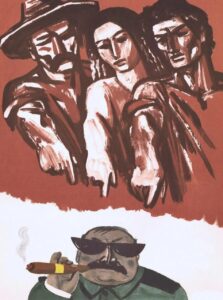
A lifelong humanitarian, Lenny was continually involved with the most pressing social issues of his day, often aligning himself with the work the UN was established to do. Over multiple decades, he conducted several UN-related concerts, His engagement with the United Nations began on December 10, 1949, when he conducted the Boston Symphony Orchestra at Carnegie Hall, in celebration of the one-year anniversary of the United Nations General Assembly’s ratification of the Universal Declaration of Human Rights: a milestone document proclaiming the inalienable rights which everyone is inherently entitled as a human being.
The program began with the world premiere of Aaron Copland’s “Preamble” with Sir Laurence Olivier narrating text from the Universal Declaration.
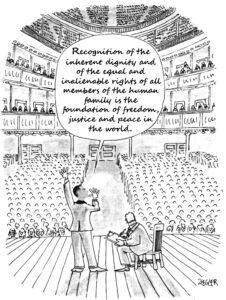
In 1989 Lenny would knock back a medal by the Bush senior administration apparently to protest against censorship of an AIDS exhibition by the National Endowment for the Arts. Like many artists and public figures, he contributed his services to concerts to raise funds to fight AIDS.
On Christmas Day 1989 Bernstein would conduct the Beethoven Symphony number 9 in East Berlin’s Shauspielhaus as part of celebrations of the fall of the Berlin Wall. For the nonce he recorded Schiller’s text of the ode to Joy, substituting the work Freiheit (freedom) for Freude (joy). Ode to Freedom was the original version, which fell afoul of the censors. Bernstein commented “I’m sure that Beethoven would have given us his blessing”.
I’m sure Leonard would never have given his to the Palestine Wall erected by the Israeli Government dividing jews and arabs,

Like many refugees from Eastern Europe, his parents left behind a situation where many were forced to live in communities walled off from mainstream society. That’s why they came to the United States .
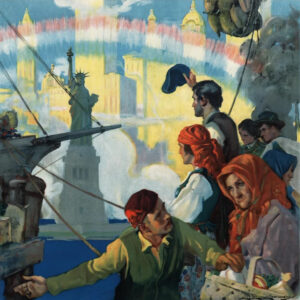
The Palestine wall split neighborhoods in two, tore through the land of Palestinians villages and trapped Palestinians in the West Bank. What’s more, most of it is built on Palestinian land — leading the International Court of Justice to deem it illegal under international law.

Israel’s legal system is one of apartheid, defined by the international convention as one of “inhuman acts committed for the purpose of establishing and maintaining domination by one racial group of persons over any other racial group of persons and systematically oppressing them”.
Prime Minister Netanyahu or whichever yahoo is in office, if you seek peace, if you seek prosperity for the Middle East and the world, come here to this gate, Mr. Yahoo, open this gate. Mr. Mr. Yahoo, tear down this wall!
Mr. Trump, or whichever chump succeeds you, discard your dream of building another.
In the Melting Pot.
I told Pearl Buck I was grateful for her passionate advocacy of racial equality. She remarked during WWII ‘If we persist in race prejudice, we are fighting the wrong side in this war. ’ She condemned the notorious anti-miscegenation laws in some states which, as in the Third Reich, forbade marriage between blacks and whites.
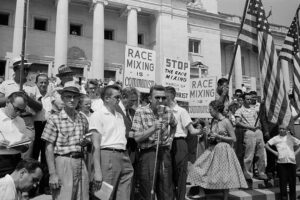
These would have outlawed the parents of President Obama. The persistent object of her civil rights activities was to break down the prejudices in adoption practices in the US. She added to her family greatly through adoption. She would have viewed with great interest modern examples of celebrities with child bearing lips such as Angelina Jolie and Madonna adopting Asian and African children. Pearl and her husband set up the first international inter-racial adoption agency, after their outrage at finding that existing services considered that Asian and mixed race children were un-adoptable. The latter were trapped between two worlds, invisible to their ethnocentric governments, neither wanting to acknowledge their existence. Six of one, half a dozen of the other.
Marching to the Mountaintop.
In the end, we will remember not the words of our enemies, but the silence of our friends.
Martin Luther King, Jr.
I told Burt Burt Lancaster I was appreciative of his long held sense of fair play. Burt was a financial supporter of Martin Luther King and the Southern Leadership Conference.
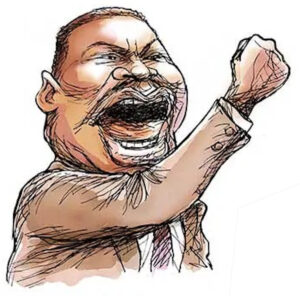
He took part in Dr King’s march on Washington for Jobs and Freedom in 1963,
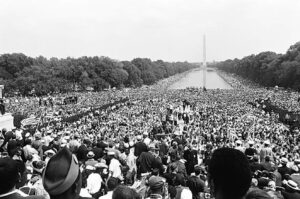
The cadre of stars who visibly supported the march risked life, limb, and their careers.
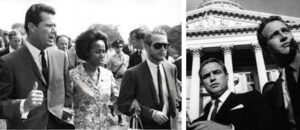
James Garner later wrote that an FBI agent called all the major stars the night before the affair, warning them that they would not be protected. Not dissuaded, they realized the symbolic strength of their stance and the power of their collective platforms.
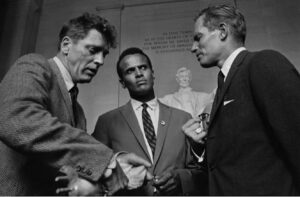
Burt was Chairman of the American Civil Liberties Union Foundation of Southern California and campaigned actively in this area. He would be one of the 575 people named on President Nixon’s ‘Enemies List’ along with Gene Hackman and Paul Newman.
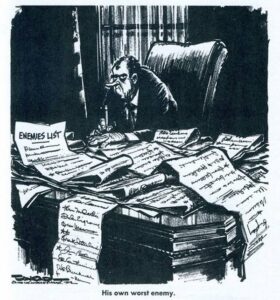
It seems Nixon was particularly aggrieved by their active support of minorities and felt those with such a prominent stature should be considered a threat.
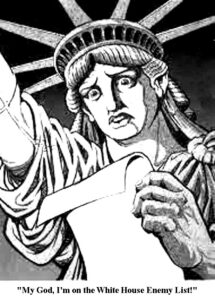
Burt would help pay for the defence of Private Billy Dean Smith, an African American soldier accused of “fragging” two officers in Vietnam in 1971. As with an increase in absences without leave, “fragging”- maiming or killing, often by means of a fragmentation grenade unpopular officers- expressed resentment by soldiers fed up with ‘humping the big pack to the boonies’ and getting blown away in totally fruitless combat operations perceived as totally fruitless. Burt paid to hire ballistics experts to testify at Smith’s court martial. He was found not guilty.
Such incidents made me wonder how we could win a war when there was still so much racial hatred, suspicion in the military. When the enemy was within.
When George Bush Senior would refer to the ACLU as un-American during the 1988 presidential election, Burt responded by appearing in a TV advertisement in which he said “My name is Burt Lancaster and I’ve a confession to make. I am a card carrying member of the ACLU”.
Russel Ward said of him, ‘He says the things that he truly feels, not the words of someone who kneels.’
Burt spoke against the ostracism of gay people when the AIDS pandemic struck. He publicly associated himself with research into this disease. At a dinner in Hollywood to raise awareness of this subject, he read out a letter from Rock Hudson to announce that he was dying from the condition. This was when the subject was still largely taboo.
Bewitched,buggered and bewildered.
There is a sacred realm of privacy for every man and woman where he makes his choices and decisions—a realm of his own essential rights and liberties into which the law, generally speaking, must not intrude. This is a principle of the utmost importance for the preservation of human freedom, self-respect, and responsibility.”
—Geoffrey Fisher, Archbishop of Canterbury.
You are who you are when nobody’s watching.
Stephen Fry
I increasingly held suspect the incursions of the state into the curtilage of the home, where everyone is open to surveillance at all times.
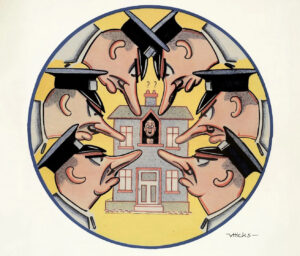
An Orwellian nightmare where there are no secrets from government as well as the Church.
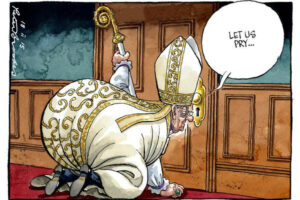
To me this objectification recalled totalitarianism in which people are classified without respect to personal conviction, sympathies or may be sent to concentration camps without knowing why. I believed this included the love that dared not speak its name. To me the home is not a goldfish bowl and what takes place there is best left there. After all, isn’t a man and woman’s home their castle?
I neither condoned homosexuality nor condemned it. I believed that outlawing it impinged on an individual’s civil liberties and recommended individual freedom in matters of private morality.
I learned that homosexuality in Britain was a crime and that the punishment could be life in prison, locked up with the other men.
On a humorous note, I also heard there was a three year waiting list.
I was shocked when I found out how backward laws had queered John Gielgud back in the fifties .
Arrested after winking at a policeman while ‘cruising ’-for a bruising, it turned out- he was charged with “persistently importuning men for immoral purposes”.
After his arrest things for him would get even stickier.
‘What a load of ‘cobblers, ’ I thought. There was nothing immoral about this man’s man. Nothing wrong with him. There’s a place for everything and the scene of the ‘crime’ was certainly not one.
On his way to rehearsal the afternoon of his arrest, he saw his name on the front page of the late editions of the newspaper. “Sir John Gielgud fined,” the headline read. “See your doctor the moment you leave here.”
Before, as an artist, few could touch him. Now, as a human being, few wanted to.
The humiliation of this very public “outing” was almost too much for the sensitive Johnny G, who cringed at the subsequent public furore. He might have had friends in low places but better still he had more in high places. The company of actors in rehearsals for his new play was totally supportive – his co-star, Dame Sybil Thorndike, greeted him affectionately with the highly appropriate double entendre “You have been a silly b****r!” His adoring public proved more than understanding and applauded him to the rafters in his next production, giving him a ringing endorsement both in the provinces and in London.
Others took a dimmer view. They quoted The book of Leviticus stating ‘that for a man to lie with another man is an abomination. ’ There was lots of hate mail. A Conservative peer, Lord Winterton, called for him to be horsewhipped in the street after being stripped of his knighthood. Five months down the line, Johnny started experiencing double vision and eventually suffered a breakdown. He considered suicide.
His career suffered on both sides of the Atlantic after officials at the British Embassy in Washington advised him that he was unlikely to get a visa to take his production of The Tempest’ to the U. S. as planned. He might prove “an embarrassment”.
Forty years ago in Britain, loving the wrong person could make you a criminal. Smiling in the park courted arrest and being in the wrong address book could cost you a prison sentence. Homosexuals had long been feared and hated as men who, it was believed, preyed on the innocent young, and were thus unfit to lead normal, happy lives. Homosexuality was illegal and hundreds of thousands of men feared being picked up by zealous police wanting easy convictions, often for doing nothing more than looking a bit gay.
In outback Australia in the eyes of some if you didn’t have a stubby in your hand and thongs on your feet- not that there’s anything wrong with that- you might as well be wearing a dress.
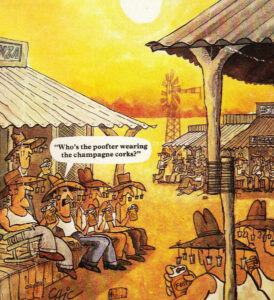
And fans of Liberace, didn’t really think of him as a homosexual – they just thought he was a great performer and just being theatrical. In our anglophone countries there was a hideous aura of criminality and degeneracy and abnormality surrounding these dangerous liaisons. After Johnny G’s arrest, public hysteria was inflamed warning that a “plague” or “epidemic” of sodomy was sweeping the land.
What were people really afraid of? That they were going to sneak in and redecorate their place?
The witch-hunt compounded fear of Communists after serving spies Guy Burgess and Donald Maclean, who were both gay, ‘jumped’, defected to the Soviet Union. Both communists and homosexuals had secret coded language that they spoke to each other, and they had clandestine lives, they met in clandestine places, they had secrets.
The pink scare took on a red hue. The personal was never more political.
However the publicity surrounding Gielgud’s arrest was one of the impetuses behind changes in the law. He had continued the role of Oscar in his own style. Castigated for expressing his natural, human persuasion in spite of his achievements. England was on the threshold of decriminalizing homosexuality by passing the Sexual Offences Act. Millions caught between a frock and a hard place were wanting to break free.
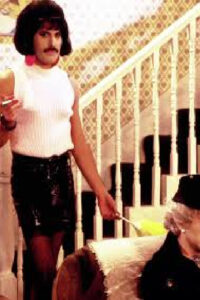
In an earlier debate on the issue the Archbishop of Canterbury, Dr. Geoffrey Fisher, spoke in support of decriminalisation. The 1967 Act was a giant leap for England. Till 1861 the punishment for homosexuality was death. On the occasion of his eightieth birthday, I wished him many happy returns.
His mobility was weakening and he had taken to using a quad walking device to help with his balance problems.
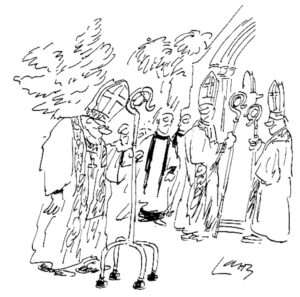
I thanked him for his support for the Act, for approval of family planning and for helping prepare the country to come out of the dark ages.
For helping many to no longer feel that every moment of every day they were at risk. To open up society to be more caring and sensitive. To have one dream, one soul, one prize,one goal, one golden glance of what should be.
To foresee this kind of magic.
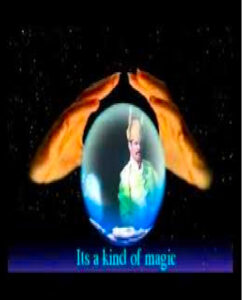
In his reply this benign authoritarian reciprocated this very same sentiment.
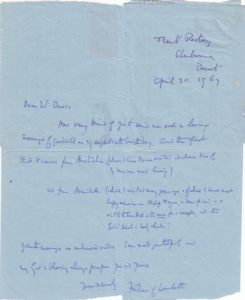
What’s good for the Gander.
While men were men, not fags, many still insisted that there too must be different spheres for men and women. The man earned the income to support the family and the role of wife and mother was central to female self realization. The husband was head of his household and under him, the woman abided. In this schema, conceptions of femininity, based on passivity, deference and chastity were expressed in gender specific dress and modes of behaviour.
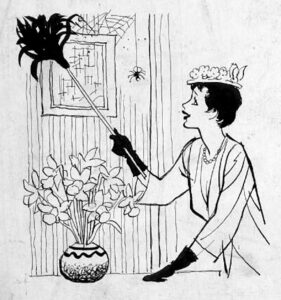
However attitudes were rapidly changing. I rejected the view that women must respect the familiar conventions of female service and sacrifice. My mother worked other than making tea, doing housework and having babies . Shakespeare portayed women as eloquent, strong in their constancy and common sense, and in some ways head and shoulders above them. And so, from that standpoint, I never have had, been of that opinion that women should be kept in a particular place.
At the same time I saw that in advanced industrial society, women’s work is overall only marginal to the total economy… women are offered a universe of their own: the family.
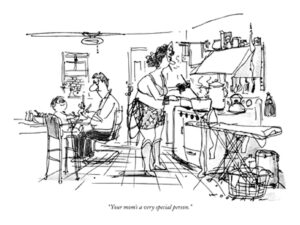
Like woman herself, the family appears as a natural object, but it is actually a cultural creation… Both can be exalted paradoxically, as ideals. The ‘true’ woman and ‘true’ family are images of peace and plenty: in actuality they may both be sites of violence and despair.
My view is that women can mix it with the best. Every bit apart from brute strength. Mary Pickford was living proof of this. I commended her for her business acumen both as a competitor and business partner of Chaplin. She helped debunk the stereotype that men are more hardedged and shrewd in business. I told her how, she had endeared herself to me with her character, the ingénue with the golden curls, full of sweetness and charm, reflecting her childlike innocence. She thanked me with a classic portrait of herself.
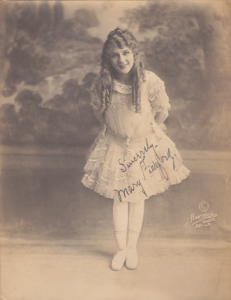
It would have been hard to find anyone with a bad thing to say about her. Both she and Charlie created a character that people adored and clamoured to see. Along with her husband Douglas Fairbanks they joined forces to form United Artists.
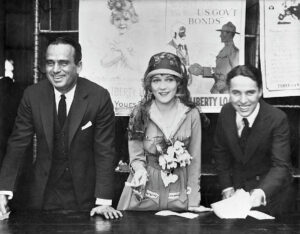
They united to produce, distribute and exhibit their own films. This gave rise to the comment, ‘The lunatics have taken over the asylum’.
The moppet became a mogul. “Everybody’s Sweetheart” was a role model for all women to challenge male dominance,

To release the invisible corset on female aspiration and break through the glass ceiling.
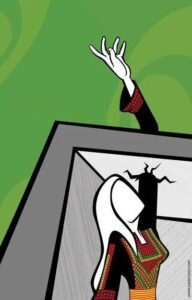
To express their thoughts as freely as men.
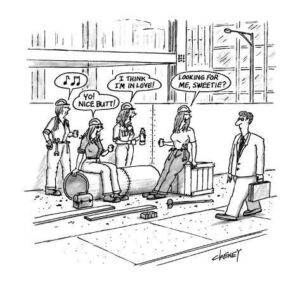 The womens liberation movement was growing strong and the primary issue was autonomy for women in all spheres of life, including equal opportunity in reproductive rights, sexuality, pay and employment.
The womens liberation movement was growing strong and the primary issue was autonomy for women in all spheres of life, including equal opportunity in reproductive rights, sexuality, pay and employment.
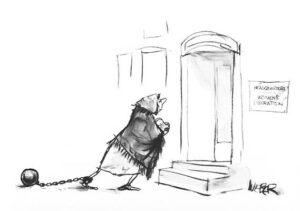
In the final analysis they wanted a fundamental change in the way society perceived women. Despite this some guys I knew continued to insist that men are born superior to females based on their physical traits.
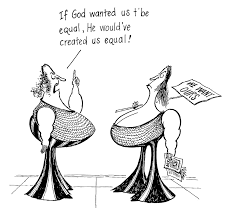
Keeping the Peace
During World War II William Fulbright worked towards the creation of an effective United Nations to carry out reconstruction of the war wrecked world.
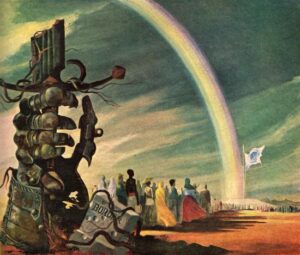
Fulbright was chairman of the American delegation that attended a conference in London towards this end. Its focus was on educational and cultural reconstruction. He had prepared for this with the passing in the Congress of the Fulbright Resolution. Fulbright said “I have no doubt that this resolution is the panacea for all international afflictions. It is the first step in the process of building a foreign policy which I hope may have better results than that which we have followed in the past. We members of the House have an obligation to see that the children of today’s heroes do not have to do it all over again in twenty years”.
The central issue of the proposed new international organization was the question of relations with Russia. Fulbright believed that the two powerful nations could work together. “Either we co-operate with Russia and the other nations in a system to preserve peace” he said “or we must look forward to the time when, in a chaotic world of warring nations, we may have to compete for survival with an industrialized Russia of 250 millions or a China of 450 millions. It is all very well to be proud of our great achievement and our power, but we must view our strength in its proper relation to the rest of the world and when we do, it is obvious that we are quite a small fraction of that world. I do not think we can possibly depend upon brute strength alone to insure our future.
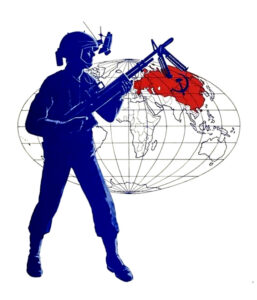
We must use our wits and intelligence if we are to survive”.
“War and Peace”, speech before the United Commercial Travelers, Little Rock, December 10, 1943.
As the war with Germany was drawing to a close, Senator Fulbright expressed the conviction that a more co-operative way of thinking was essential in the merging scene. “All of us – have for years felt that something is wrong with our society”, he told graduates of Gettysburg (Pennsylvania) College. “In the midst of huge surpluses of all kinds of goods, we have depressions, unemployment, closed banks, soup kitchens, and now a second war that threatens the existence of our way of life. I should like to suggest that the source of our troubles may be found in our failure to recognize what I have called the essential interdependence of all men and of all nations”.

He emphasised the benefit of countries mutually vested in a trade relationship and engaging in the exchange, purchase, or sale of goods.
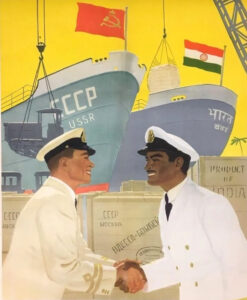
He strongly believed in the workers’ right to organization and collective bargaining. In the Senate he introduced a bill to repeal the act barring credits to nations which had defaulted on their debts. He was convinced that the questions growing out of the World War One war debts had poisoned the climate of international relations. He said “I never have thought we should have tried to collect the old war debts”. The bill which failed, would have cleaned the slates of the founding members and offered a more auspicious baptism of the UN.
No one needs convincing that the questions growing out of debts between countries today have poisoned our own climate of international relations.
Like-minded to Pearl Buck, Senator Fulbright is best known for the system he established for the exchange of students and teachers between the US and other countries. He sponsored the Fulbright Act of 1946 providing funds for this purpose, thus showing how the US could set an example unilaterally for promoting better understanding between the people of his country and others.
Chasing the Flame
“The real function of the United Nations is to act as the custodian of social justice. It should not just serve as a policeman”
Tony Benn.
There are some in the world who are prematurely resigned to the inevitability of war. Among them are the advocates of ‘preventive war’, who in their resignation to war, wish merely to select their own time initiating it. To suggest that war can prevent war is a base play on words and a despicable form of warmongering. The objective of any who sincerely believe in peace clearly must be to exhaust every honourable recourse in the effort to save the peace.”
Ralph Bunche
Also helping lay the groundwork for the UN was Ralph Bunche who served as an undersecretary. He was considered an authority on problems of colonialism. He worked with Count Folke Bernadotte the UN mediator in Palestine, on the Arab-Israeli dispute after being appointed to the UN Palestine Commission in 1949.
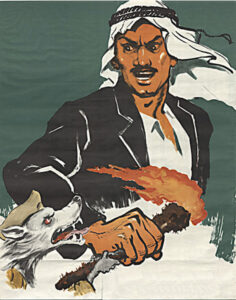
Dr. Bunche won the 1950 Nobel Peace Prize and the respect of King Faisal l for this work.
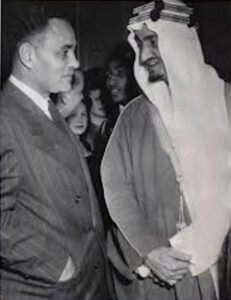
After the assassination of Bernadotte by self declared Israeli terrorists, Bunche acted as a go-between and arranged an armistice in 1949.He worked to have the United Nations General Assembly Resolution 194 adopted by member states. The Resolution defines principles for reaching a final settlement and returning Palestine refugees to their homes.
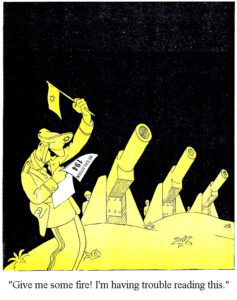
As with most other UN resolutions over the years Israel would defiantly flout them.
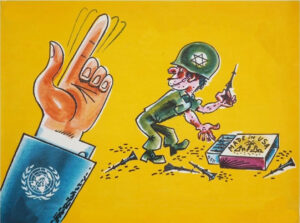
No prizes for pointing out that stopping these open acts of warfare would long continue.
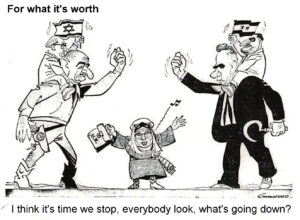
Getting agreement between Arabs and Israelis would remain an extremely difficult, involved problem.
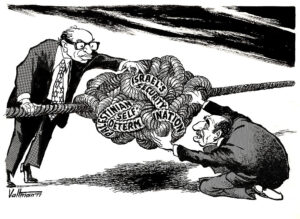
Dr. Bunche played an important part in the UN intervention during the Suez crises.
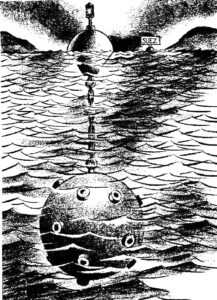
He made a valuable contribution in it’s intervention during the 1960 fight for control of the Congo .
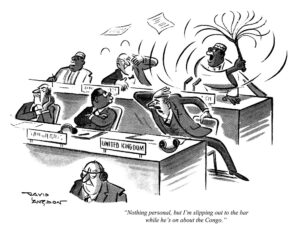
Ralph was a comrade of revered leader and visionary Martin Luther King Jr.
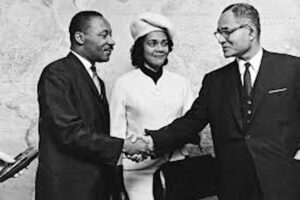
In 1965 he took part in the marches held in in Selma and Montgomery, Alabama to protest racial discrimination.
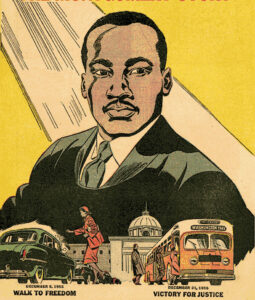
He fronted one of the marches alongside MLK
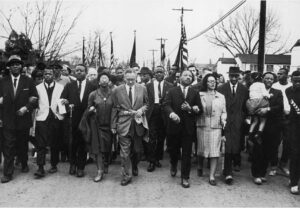
As a painful reminder of the recent past, this took them across the bridge named after a Klan leader.
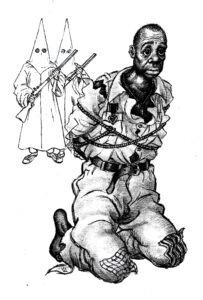
The marches were opposed by the white robed, masked extremists who were determined to maintain their social dominance. Having sworn allegiance to their particular interpretation of Christianity, they declared Dr. King’s vision to be false and blasphemous. They recruited ministers as members.
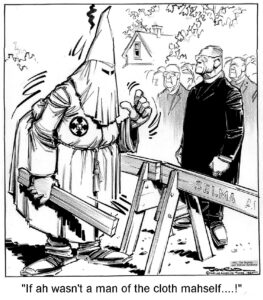
The marchers were subject to attack by State troopers and county possemen.
The regular troops were armed with billy clubs and tear gas.
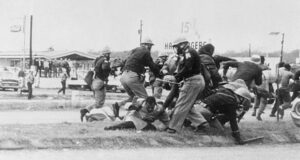
Vigilante hicks, would be bossymen not wanting to miss out on the fun, made do with blocks of wood.
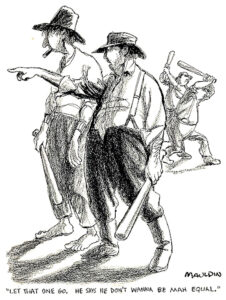
News of the marches would reach all corners of the world.
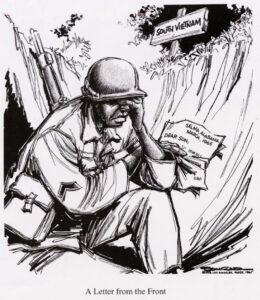
They were part of a dangerous campaign to secure equal voting rights.
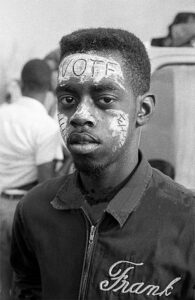
Marches would be held in solidarity across the country.
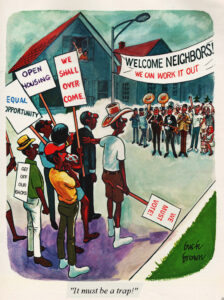
The campaign continues to this day and the road is hard and painful.

How many must a man walk down before you call him a man?
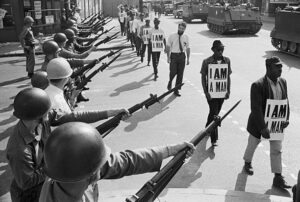
How long does it take for all people to be treated with dignity?
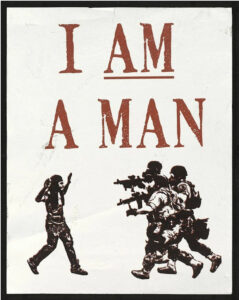
There were and still are those afraid the thorny path should go more gradually.
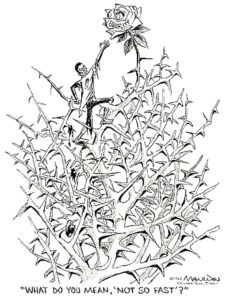
The epic march from Selma to Montgomery culminated in President Johnson signing the Voting Rights Act of 1965, one of the most significant victories for the civil rights movement.
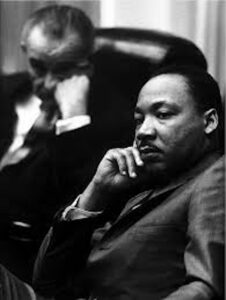
Martin hoped the victory would would somehow inspire LBJ to heed the demands of of the anti-war movement but this would not come to pass.
Nevertheless this struggle of brothers and sisters in the movement prompted change. It forever altered history though not as peacefully as MLK desired.
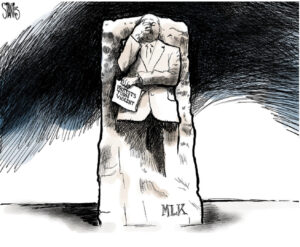
Dr Bunche appreciated much my kind words and good wishes.
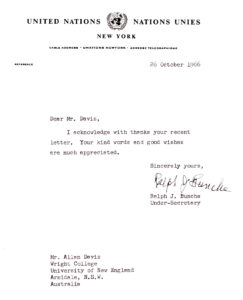
His glass half full, Dr Bunche believed that progress in human relations could catch up with the scientific advances that the world has experienced. His message about how to bring this about is simple and as compelling now as it was when he stated it in 1953. “There is, to be sure, an increasing though slowly growing, feeling of kinship among all people, a recognition of the interdependence of nations, and an enlarging sense of social responsibility, national and international.
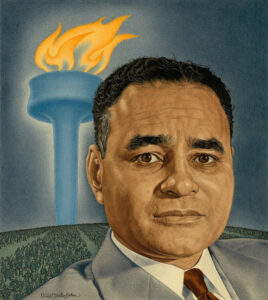
Now more than ever in human history, we have the knowledge and the means to avert the disasters brought on by war, and to solve all the problems of human relations. Difficult as these may be, experience has shown that they are capable of solution”.
No greater example of this can be seen than that of the end of ‘the balance of terror’ between the US and the USSR. Losing this war of attrition Russia was confronted with huge problems after the implosion of it’s moribund command economy. However they are far less than those it would have encountered continuing the arms race the way it was going.
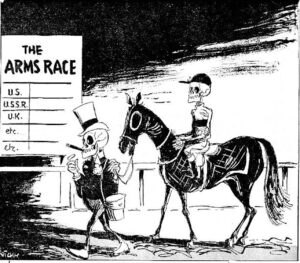
This was with an adversary so committed to endless military build up. Indicating it was more flexible than painted, The Soviet Union , this force that we were told was hell-bent on taking over the world, stepped back from the precipice towards which we were racing.
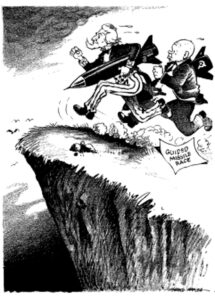
We cannot presume the same degree of reason exists among god fearing global terrorists.
Pax Australiana.
He maketh wars to cease unto the end of the earth; he breaketh the bow, and cutteth the spear in sunder; he burneth the chariot in the fire.
Psalms 46:9.
Courtesy of the SRC at UNE I took the opportunity to attend a mock Security Council meeting at Becker hall in Canberra. It was to be addressed by Paul Hasluck, Minister of External Affairs in the Liberal government.
Prior to my departure Russel invited me into his private quarters for a nightcap and to coach me on the man.
‘Hasluck was in Australia’s delegation helping set up the U. N. He actually penned a major speech by Evatt on the future of Australian foreign policy. ’
‘That would suggest they share many ideas’, I said.
‘Yes and No’, Said Russel. ’ Hasluck maintains as did Doc before his death that Australia as a small nation should have a greater say in world affairs. But Hasluck thinks in the script we should stick closer to the Americans , particularly when the stick is thick. He also took a personal dislike to his delegation head. ’
‘Not as much as for Gough Whitlam’. I said.
‘You can say that. ’Whitlam threw a glass of water at Hasluck after he had taken a dig at him. ’
‘ What is his policy on the Vietnam War?
‘From his public statements he’s an unabashed and penultimate hawk, if you will. In the aerie of interventionist advisors, he’s a convinced believer in the ‘domino theory’ and a sceptic about attempts at mediation. He’s a very able parliamentary exponent of foreign policy. With his tailored answers, he’s easily drawn. He takes part in ‘teach-ins’ where the bulk of the large audience oppose him. It seems the unpopularity of his cause fortifies him.
‘What are his pastimes?I asked.
He’s a keen horseman ‘said Russel. ‘He used to ride a sulky around wartime Canberra when there was petrol rationing. ’
‘I’ll try to slip in a few words with him, ’I said, ‘as one having been taken for a ride.
‘ Just to be be on the safe side’. advised Russel, ‘ when you state your case, get your facts straight. Don’t expect them to come off the top of your head. And don’t be afraid to question him to his face. To draw out the lies that expose . Them that asks no questions don’t get told no lies. ’
The Shine Dome.
‘Could you direct me to Becker Hall? I asked a Canberran on my arrival, walking the manicured streets.
‘You’re looking for the ‘Martian Embassy’ was the reply.
‘Is it walking distance? ’I asked.
‘Everywhere is walking distance if you have the time. ’
As I got closer I asked another informed local. ‘Oh, the igloo, you mean. Turn left, then just follow your nose and you’ll see it on your left. ’
On reaching it I got the jokes, affectionately or ironically expressed. I could visualise it’s effect at night, illuminated by large discs set in the dome. Yet it fits in perfectly with it’s surroundings, it’s shape a corollary of the rounded hills and mountains which enclose the valley of Canberra. To enter I had to cross a moat surrounding the Hall in which the base of the dome sits, anchoring it. A reflecting pool distributing evenly the light from the sky. I was stoked to be in the architecturally unique building. Housing the The Australian Academy of Science, Sir John Eccles, it’s president, had compared the marvel of it’s simple yet complex design to that of the nervous system. The largest dome in Australia at the time, it supports itself, with no internal wall holding it up. All the internal spaces had been all deftly moulded into a simple circular plan with circumferential circulation inside and out, and housed in a concrete, copper-clad dome. To contain the thrust of the dome, it’s lateral spreading, a massive concrete ring beam, built as a moat that straps everything together like the hoop on a wine barrel, had been devised.
After registering, I made my way into in the large large conference hall with it’s raked seating. At the end of our session, Hasluck tarried well after his scheduled time for departure and our coffee klatch had the opportunity to listen to him informally and ask him questions about the pressing issue. Compactly built with a neat moustache and dark hair, he argued the case for the war and the U. S. alliance very strongly.
‘A great people bears great responsibilities. To deal with increased turmoil in Asia, Australian governments forged in the 1945-49 period the fundamental basis of Australian post-war foreign policy: the alliance with the US which has been maintained at full cock ever since. It found clearest expression in the ANZUS and SEATO pacts and Australian participation in Malaya and now Vietnam. Does anyone have any doubts about this? Feel free to ask questions. You have the floor. ’
‘Why precisely do we have to be in Vietnam?’ one student, first off the rank, asked.
‘If you would indulge me for a few moments I’ll tell you why. We have to be in Vietnam to protect our national interests. We need to expand our place in a growing and profitable global free world economy. Such a world order could absorb Australian exports and provide both commodities not produced locally and capital flows to cover the typical current account deficits. A Communist victory would limit the scope for private enterprise by imposing restrictions on trade and investment, while providing encouragement for other similar movements. A successful so-called national liberation movement could provide military advantages to the Soviet bloc. They would become the wave of the future. ’
‘Can’t we protect ourselves better by developing a strong, independent territorial military force?’
‘ Our engagement with our region together with our allies is the sine qua non of Australian foreign policy. We can be neither isolated nor isolationist. We must hold the line with a high degree of commitment . We are trying to bring peace and stability to North and South East Asia where our security lies. For our part we need to develop more national self-respect and self-confidence commensurate with our role as a significant regional power. However it is insufficient for Australian foreign policy makers merely to assert this priority . Our critics need to understand that Australia’s interests and its values will not always be the same as others and accommodation is not always an appropriate response. There needs to be more debate about how the Asian region actually works and where the political weight in the region lies. All politics, be it domestic or international, is based on the successful exercise of power. Our foreign policy must be based not on dreamy idealism, but on a clear-headed understanding of the power structures of the region. We need to understand the weight of various regional powers and how the interrelationships between those powers affect the underlying security of the region. We must keep the power balance stable.
The United States, through its engagement in Vietnam, plays a particularly important role in balancing and containing potential rivalries. Make no mistake, it is our sheet-anchor in time of danger. We have to act in concert with our powerful friends, to cement the U. S. into the security architecture of the region. Because of our close ties with the U. S., we carry substantially more weight throughout the region in security issues than would otherwise be the case.
‘Are there any more questions? Please feel free to ask any you like. Fire away at will. ’
‘Sir Paul, ’I asked, ‘ you say there should be more debate about our engagement. You see yourself as practical and realistic in the way you both assess trends and develop policy. Am I correct on this?’
‘That is correct. ’
‘Sir Paul, graced as we are by your presence, let me say there is no military solution to this war in Vietnam . Only a more fiery hell and higher water to go through waging it. ’
‘Young man, take my word for it- we are winning in our noble cause. Don’t pay too much attention to reporters with their shock horror reports. They are giving a false impression we are losing the war. It may interest you to know the kill ratio shows that the strategy is working, that many more Communist troops are being killed than Americans. ’ ’
‘Hold your horses, Sir Paul. ‘Isn’t this begging the question. As the principal criteria for measuring success in Vietnam, there is a strong incentive for commanders to deflate the number of enemy combatants and to inflate body counts, ’I said, taking on the role of interlocutor for our anti-war presence. If soldiers go out on patrol and come back without being able to say they killed anybody, then that’s regarded as an unsuccessful operation. Westmoreland maintains that the enemy body count sufficiently validates what the Pentagon is calling the ‘meat grinder’. Competitions are held between units for the highest number of Vietnamese killed in action, or KIAs. ’
‘That’s good, ’exclaimed Sir Paul, ‘that’s really good. And do you think the V. C. don’t keep tabs on the numbers they kill?’
‘Focusing on the bodies tabulated on a football-like scoreboard incentivizes officers to bend the rules of engagement. This is in favour of killing potential “insurgents”, although in many instances they might have been innocent civilians killed in the so called program of ‘pacification’ one of the many euphemisms they employ to cloak these grim processes.
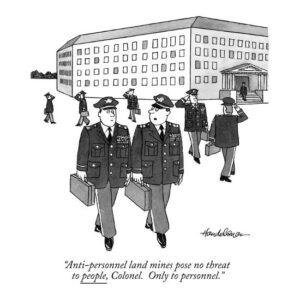
These killings are usually counted as enemy dead, under the unwritten rule.
‘And what’s that if I might ask?’
‘If he’s dead and Vietnamese, he’s VC’. And of course the exonerating circumstance is that ‘we were only carrying out orders. ’ We have an unshakeable faith in quantitative, so called ‘cost effective’ methods. We use “body counts” as pointers towards us “winning” the fighting . By cooking the books, statistics are easily fudged by number crunching army careerists trying to advance .
‘Let me get this straight. You’re claiming that our allies are deliberately and fraudulently distorting the actual record of their activity there. Where are you heading with this ? Well?’
‘Well what. Army and marine officers know that promotions are largely based on confirmed kills. The pressure to produce confirmed kills can result in American commanders exaggerating body counts . My question is: Has the U. S. government ever really gotten away from this macabre practice. It’s a false indicator of “winning”.
‘ I beg to differ, young man. It’s your privilege to think what you like. However this is not a linear, conventional fight in which territory taken and held is the proper and tried true yardstick of success, ’said Hasluck. ‘This is not a war where you gain and held terrain. You need to have some indicator of success. Westmoreland points out the U. S. is killing ten Vietnamese for every one American casualty. ’
‘Americans don’t care about the ten, they care about the one. Moreover success can never be based on the numbers of civilians killed. ’
‘Take it from me, we and our allies place a high value on human life. ’
‘Yes, we know all that. And what’s the going price per scalp? Five dollars it is, or has the rate gone up? We know the C. I. A. offers bounties to informers against alleged N. L. F. members or sympathizers. They are generous to a fault—-if it’s their own. We also know many Vietnamese are falsely accused by the massive Phoenix informer network. Many of these accusations later prove to be false or at least untrustworthy. Informers often use Phoenix to settle old scores with enemies who hold no particular political ideology. The C. I. A. ’s roster of sociopaths can disappear anyone they like-or don’t like- in their “snatch and snuff’ black ops. Blow them away, drop them out of helicopters, cut off their ears and fingers.‘ Souvenirs of their kill.Eyes, nose, scalp, privates. ‘Neutralization’, isn’t that what they call it?’
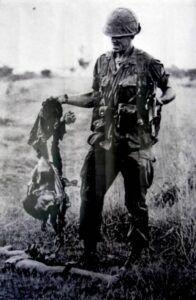
‘Perhaps if you were better informed, you’d know the Viet Cong use terror and other forms of coercion to recruit unwilling civilians, most of whom are poor rice farmers. They blow up allied servicemen in all ways. Remember what they did to the Brinks Hotel. ’
‘Two wrongs don’t make a right, and if we count the French why try three. Just because they did something bad like this doesn’t give us the right to do it to others. Their misdeeds don’t cancel out our side’s. ’
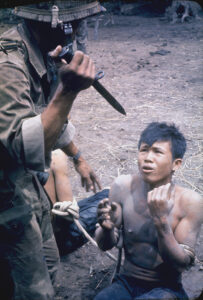
‘We don’t act like they do. To say so is a malicious lie!’
‘Is it? Phoenix has established quotas requiring the mandatory disclosure of so many hundreds of suspected V. C. or V. C. sympathizers each month. Since then this process has accelerated. Money flows out and quotas are met, even though the disclosures are unreliable and even unprovable. So just who are we fighting? ’I asked.
‘ Have you been listening to a single word I’ve said. The Viet Cong. They are Communist insurgents.
‘With its structures and disciplines, communist military theory is the means by which Vietnam’s war of independence against the French was fought and won. We didn’t complain when they used it to see off the Japanese.

Without any quarrel with Australia, they’ve never raised a hand against us. They want an end to the colonial era, not an end to what you’d call the Free World. To act otherwise is a total misreading of the situation which could cost us very dearly. Did you know the Communists are only one element of the resistance. ’
‘I didn’t’, He said sarcastically. ‘So surprise me. ’
‘We’ve been told they’re just ‘Reds’, but this is a horse of a different colour. The NLF leadership in the south is an alliance of Catholics, liberals, Buddhists and Communists. Most of those fighting in the northern army are peasant nationalists. If the NLF, or Vietcong as you call them , are also South Vietnamese, how can they possible invade their own country? ‘
‘May I continue. I submit they are involved in internal aggression. The North Vietnamese are rolling out the red carpet for their troops.
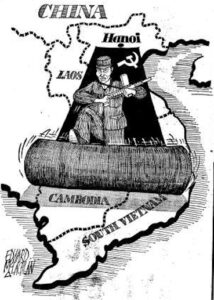
They are levying a cruel war against the south. President Johnson says if they’ll go home tomorrow, we’ll go home.”’
‘ Hold on a moment-they are already home. To truly defeat an enemy, you have to know them better than yourself. Let’s face facts. There is only one Vietnam. Period. If the Geneva Accords are to be taken as a basis, it is all one country. For good or ill. There had been no North Vietnam and no South Vietnam until the Geneva Conference on Indochina in 1954 had temporarily divided the country to await national elections two years later.
‘Is that a fact? Do you think Communists have ever respected the result of democratically held elections. ’
‘The record is clear here. Forgive me for correcting you but it’s the Americans who sabotaged these elections and violated its military provisions. For no good reason. They knew Ho Chi Minh would win hands down. Plain and simple. Who do you think said this: “I have never talked with a person knowledgeable in Indochinese affairs, who did not believe that 80 per cent of the population would have voted for Ho Chi Minh.”
‘You tell me if you’re so knowledgable, young man. ’
‘It was none other than President Eisenhower – and I hope my youth is no disqualification in this knowledge-who warned of the dangers of the military-industrial complex. ’
‘There are dangers for sure. I’ll give you that. What kind are you thinking of?’
‘For starters, under-estimating your enemy. You have grossly underrated his ability to resist. They’ve been fighting for decades. ’
‘That’s not saying much. That’s why we’re there- to put an end to it. ’
‘This is not a case of conventional cross-border aggression. The resistance sees one Vietnam, not the random line on a map created by foreign politicians including the French after the Japanese were seen off. The reality is that the border between North and South Vietnam is a geographic line on maps, not a divide between two peoples or two countries. ’
‘Well what do you know! We learn something new every day. ’
‘There is no getting away from the fact the resistance enjoys widespread support in rural Vietnam. Like the moat that straps this building together, the Vietnamese are held together by their desire for independence. Like Becker Hall, it supports itself and doesn’t depend on anything to hold it up. On the other hand the U. S-backed Saigon government is deeply split, unpopular and relies heavily on being propped up. ’
‘Oh come now, don’t give me that. Aren’t you being rather carried away by romantic ideas. The noble colonised throwing off their chains. We only want what’s best for the Vietnamese. ’
‘They’re not exactly doing handstands when they see us coming, are they. They’re not queueing up to chair us aloft, strew petals, shower confetti, spray holy water in front of our path, throw themselves down and kiss our feet. ’
‘We genuinely want to help them.We might be conservatives but we are compassionate.’
‘That sounds like drivers of Volvos with gun racks on top.’
‘The West is not there to conquer but to liberate. To advise and assist.
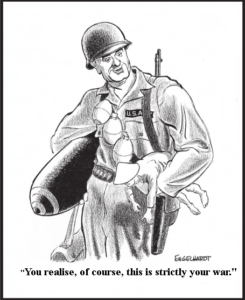
It has done so much to improve their lives in so many ways. It’s a better country for our coming. We help them to help themselves in nation building. Why don’t you talk about all the good we do them? The greater good I might add. All that we give them. ’
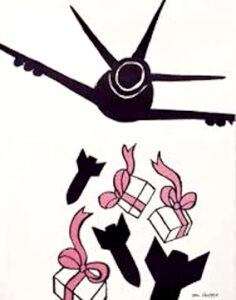
‘We’re doing so little good for them, I see no point in commenting on it. ’
‘We’re doing more than any Communists. Just keep in mind whatever mistakes we make up there the alternative would be ten times worse.Hey,for all I know you might be a member of one of their parties. ’
‘Now you’re guessing. ‘
‘The West has done more than any number of guilt-ridden, self loathing peaceniks with their fairy floss futures blocking the middle of the road, this ratbag element giving aid and comfort to the enemy. ’
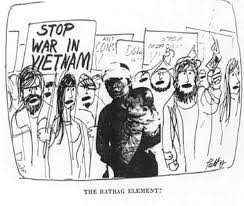
‘Sir Paul. I wasn’t born yesterday. Let us guard against historical amnesia.If we can’t acknowledge the past, then it seems to me we’re not going to be able to make the necessary correctives for the present impasse. The Vietnamese resistance ousted the French. Roosevelt accused the French of milking them. When Gough Whitlam told you in the House the French were denying Vietnam’s liberty, you argued they were defending it. ’
‘Wait a minute. Don’t bring Whitlam into this. Don’t you dare. I won’t have it from you. ’
‘Now we are fighting to defend a government we established in Saigon to invite us in, one whose army is designed to maintain it’s grip on power but nothing else. We’ve had to upend regime after regime in that effort. Haven’t we just been beating a dead horse? Finally we simply invaded outright. That is plain, simple aggression. ’
‘You talk as if you’re St. George and we’re the dragon. If you want to think like that, let me assure you, unlike the dragon, we have no weak spot. ’
‘Well guess what. Today the national resistance demonstrate they will fight us to the death. Westmoreland has underestimated the speed with which the NLF could replace their losses. Events speak for themselves. The NLF appear to have abundant supplies of men and women willing to fight for the overthrow of the South Vietnamese government. Even if we stay one thousand years. They’ve got time on their side. We can only lash out like trapped snakes. We’re not winning. Only the undertaker is. ’
‘I’ve heard that one before. Try telling it to Hanoi. The sad truth is we have to intensify our efforts in order to bring the killing to an end. ’
‘Says who?I asked.
‘Says Dean Rusk’. He asks ‘Where would be the incentive for peace be without the pressure of the bombing?’
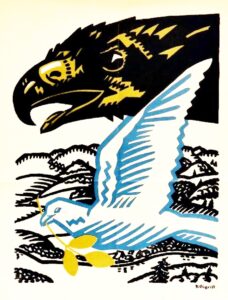
‘We can play god, plastering them back to the stone age, but how does this make for a meaningful ceasefire? We can bomb them into pieces but we can’t bomb them into peace. For many soldiers the reason for why they were sent there remains to be seen. ’
‘You’ve got an answer for everything, haven’t you. ’
‘We have to have answers. Straight ones. Not eyewash. There’s none of General Westmoreland’s ‘light at the end of the tunnel’, only greater darkness. Thinking they were smarter than their adversary led the U. S. Army to Little Big Horn. ’
‘Well congratulations. And what movie did you learn that from?’
‘The resistance have quickly learned to avoid the large battles Westmoreland wants to lure them into. When they see them coming you won’t see them for dust. He is put to locating and forcing the Communist’s main units to battle. The Catholic officered South Vietnamese military, trained in the American image, are unable to staff adequately the artillery and air power it relies on. They have failed to protect the population. Instead they’ve alienated large numbers of the rural people of southern Vietnam. To a Vietnamese peasant whose home, a lifetime of back breaking labour has been torched by us, it will take more than our promises of a democratic future to convince him we’re on his side.
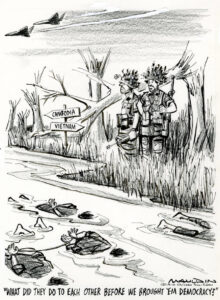
It will take more than driving women, children, old people from their ancestral homes, herding them together into concentration camps, ringed by barbed wire, moats, bamboo spikes and watchtowers. I hasten to add that in the “free fire zones,” all persons remaining within them-civilians, old people , children—can be considered an enemy and bombs dropped at will. ’
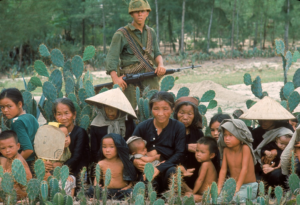
‘Wake up to yourself, young man, ’he said, wagging his finger up and down, ‘Get it straight. You’ve been listening too much to Hanoi Hannah on your shortwave. They’re nothing like that. Let the record state, these ‘strategic hamlets’ are designed to protect them. To win their hearts and minds. Do you know what this means?’’’
‘ Yes. You’re referring to the best parts of the body to shoot at. The so called ‘safe villages’ approach. It means victory for your side will be elusive- the same as when the Boers were forced into camps. Their towns having been destroyed in order to ‘protect’ them. On the battlefield Westmoreland has ordered that no military action involving US troops could take place with less than 750 troops. Isn’t this in and of itself an admission that the NLF is going to be a lot more difficult to defeat than was first thought of. For a better future the Vietnamese need bridges, not ditches. Military solutions to political problems fail. For how long can we have both guns and butter? This is no noble cause gone wrong. We don’t have the white hats on. We should never have gone there. We are the wrong side. My conscience tells me so. ’’
‘Young man, how old are you?’
‘I’m twenty. ’
‘Conscience means nothing to me unless it’s educated. You have to be in a situation to evaluate things correctly. ’
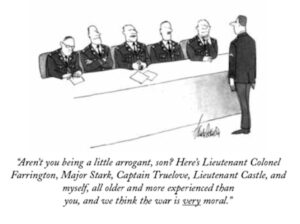
‘And this qualifies you in this? Feeding false reports, coercing people into choices antithetical to the policy choices that got you elected. Seriously where do you see this going?’
‘These matters are more complicated than you imagine and take years of experience to understand. Barely weaned and yet you think you know it all. You show yourself to be misguided, misinformed and misunderstanding.’
‘And you, Sir, with all respect for your experience, show yourself to be distrustful, discouraging, and discombobulated.’
‘Here you are twenty years old and trying to tell us how to run the world. You’ve seen nothing. You haven’t lived yet. ’
‘I’ve lived long enough to ask the right questions. In light of all this carnage, isn’t there a strong case for a total drawdown?’
‘Are you soft in the head? How long are you people going to keep on asking the same question?’
‘Until we get an answer. Your alliance has no exit strategy.
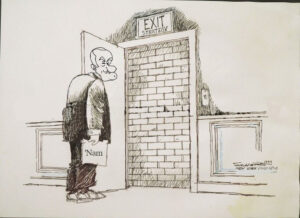
Ours is to extend an olive branch to the resistance and demand all foreign forces beat it out of there. On the knocker. No shilly shally. Not just a stand-down but a smart, prompt negotiated retreat.’
‘What is it about our country’s safety you don’t understand? Well let me help you. It’s non negotiable. Not with the Hanoi regime. Not with Moscow. Not with Peking. I will not apologize for keeping our families safe. And I will not apologize for doing what needs to be done, so our loved ones can sleep peacefully at night. We need a responsible withdrawal, not one oblivious to our interests. We can’t just get involved in a place, tuck tail and then walk away.’
‘This is neither the time and place for drawn out, attenuated gradualism . Look for the off ramp. End this transactional arrangement. Let the Vietnamese take back their own country. That’s the only plausible strategy. ’
‘You’d just like that, wouldn’t you. ’
‘We were up to our necks early on and there is nowhere to go but down. How much further down are we going to go?’
‘Have you taken leave of your senses?’ Hasluck said. ‘It needs to be understood that we do pay a price for the ANZUS alliance. There are larger considerations than just Vietnam. The U. S. cannot withdraw from South Vietnam without necessarily considering the worldwide impact on the broader strategies of world politics. ‘Auribus tenere lupum. ’ Our allies would see it as a stab in the back. It would be suicidal without reciprocity from the other side. There would be a bloodbath. No one in their right mind can argue that. How could we live down such a stigma? We have to see our mission through whatever it takes. Then we’ll leave in our own good time on an orderly, step by step and scheduled timetable.’
‘I get it. A phased withdrawal. Phased like the coffins that bring the remains of servicemen home trundling down the rollers of the cargo loaders.
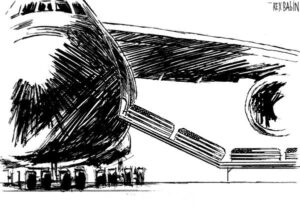
Undeniably it has to be deliberate, carefully thought through, coordinated in advance, debated and the groundwork laid. There needs to be a plan, a series of steps. There needs to be an assessment of risk based on conditions on the ground. There needs to be some kind of a backstop.’
‘This shouldn’t be necessary. Westmoreland assures us that the defeat of the NLF is only a matter of time as they are now engaging more and more in open combat as opposed to guerrilla warfare. To cut and run would be to betray our allies and expose them to a bloodbath’ , he said, dancing around the issue. ’
‘ Sir Paul, we should have thought of this before we started wearing this albatross. We ignore the past’s lessons at our peril’, I pointed out.
‘What did I just say? The Chinese will seize the chance to move in. It’s an open invitation to them: ‘Come on in, Comrades, the door is wide open’. Do you think we can go on living our nice, quiet, peaceful lives if they win? They’ll swallow us up.’
‘So you see this as an existential threat to us and our allies?’
‘We’re not the only one to think like this. Dean Rusk sees this as a test of Asia’s ability to withstand the threat of ‘a billion Chinese armed with nuclear weapons, ’ he replied. ‘Hanoi is a stalking horse for Beijing in Southeast Asia.’
‘Come again? Isn’t it time to lay this scarecrow to rest? It’s clear now that for ideological reasons China is not a satellite of the Soviet Union.
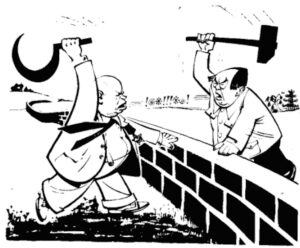
Are you not too ready to accept that North Vietnam is a satellite of China. China supports the North as what it sees as a bulwark against further U.S. advance.
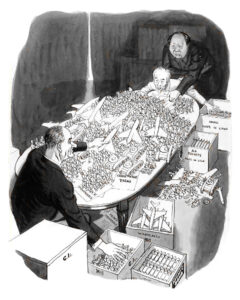
Available evidence is that there are no Chinese troops in Vietnam, nor anywhere else outside of China. Many are actually stationed along the border with the Soviet Union ready to fend off a feared invasion from their fellow Communist state. China’s military posture is that of strategic defence, whereas that of the United States is more of an offensive, rapid forward deployment.
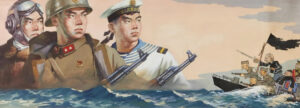
Have you not failed to take on board the rueful advice of the French foreign minister, Couve de Murville, that the Vietnamese were habitually resistant to Chinese domination. Wouldn’t it make more sense to help them build a counterweight to the Chinese, their ancient foe, if they’re the ones we fear.
‘For your information we don’t recognise the Governments of North Vietnam or the People’s Republic of China, ’he replied. ‘Our treaties preclude this. ’
‘Sir Paul, that’s beside the point. Couldn’t we engage with Asian countries by ourselves? Do we have to bend a knee to the U. S. at every turn?
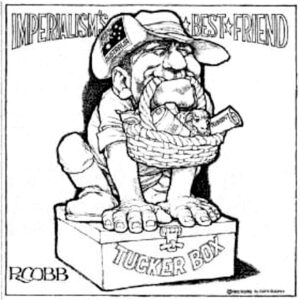
We shouldn’t make our policies based on lobbies, based on what other countries think we should do. We should make them on what’s best for this country and for the world. Some argue that our policy of engagement with Asia could be pursued more effectively without ANZUS. The argument goes that we could develop a new regional force of middle powers with many of the ASEAN countries to provide a counterweight to China . This would have the benefit of integrating us more intimately with our neighbours and avoiding the major irritant we have with China on U. S.-related security issues.
‘Now look here young man, the problem with this arrangement’, he said, stiffening at the suggestion, ‘is that it would, ipso facto, weaken the role of the U. S. in regional affairs which in turn would destabilise the power balance and cause the rot to spread.
Secondly, it makes a fairly heroic assumption about the degree of unity and cohesion amongst ASEAN nations in the domain of security. Now, any last questions?’
‘Try this one, ’I said, lobbing another .‘Doesn’t the the presence of joint facilities with the U. S., such as Pine Gap, inevitably mean we would be identified as partisan should the Americans get into heavy duty military conflict in the region?’
‘ I beg your pardon, this argument has so many holes you could drive a coach and horses through it. The view that Pine Gap makes Australia a nuclear target is an alarmist one. Some in the Federal Opposition say that, if the U. S. were to develop a National Missile Defence System to shoot down missiles heading to America from Russia or China, then it would refuse to allow Pine Gap to be used to identify the offending missiles.
They say they would turn Pine Gap off if a missile were heading for the U. S. and the U. S. had the capacity to shoot down the missile. But if the U. S. could do nothing about it that would be okay!
I can’t for the life of me believe the U. S. would keep Pine Gap going and maintain ANZUS if that were Australia’s policy.
Do yourself a favour and think more critically about this view. It exposes a simple truism of Labor Party policy.Regarding ANZUS Labor has always been as tepid as old bathwater.. Arthur Calwell claims to support it but says the Government is misinterpreting it. None of this is to suggest that there are not many other arms to our security which supplement but can never replace our ties with the U. S. Now I think I’ve said it all. ’
‘Really Sir Paul, you’re really modest. You haven’t said it nearly all. What about all our friends in the north?You say we have developed a web of security ties throughout the Asia region- a series of security dialogues with Japan, South Korea, the Philippines and Thailand. ’
‘Look I don’t need a speech. Could we skip the build up and get to the main event?’
‘Why not develop a security dialogue with China, a more mature and practical security relationship? We should work towards normalization of relations, towards what’s known in the diplomatic parlance as a ‘grand bargain. ’ That’s the only way forward. Fears of Chinese expansionism have virtually no factual basis. ’
‘You ought to know, I suppose. ’
‘ The United States cannot possibly be the guarantor of about half of the world against the other half of the world where most of humanity are, thus turning that half into explicit or implicit threats. Communist aspirations for world domination are not the basis of resistance to the United States and its clients in Vietnam. The Yellow Peril idea is no more than a myth. It’s the product of a one sided narrative. ’
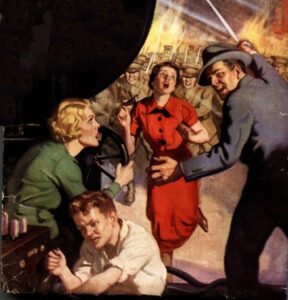
‘So you say. And the Vietnamese are not being coerced into supporting the Communists?’
‘There are concrete reasons why ordinary people might support Communists. Support for Communism in Vietnam grew out of the role of the Viet Minh and National Liberation Front in resisting foreign domination and corrupt regimes, that is, in leading an essentially nationalist movement. Objectively the level of threat to Australian territory is very low.’
‘Is it now. You think you’ve got it all worked out, do you. Better than that of all our professional military intelligence . ’
‘A contradiction in terms if ever there was. Objectively the threat to Australian territory is at an all time low. None of the countries in the region has an interest in armed conflict with Australia and, even if they did, their military capacity is fiddling compared with Australia’s own.
‘Of course you’d know all about that, wouldn’t you. ’
‘Not at all but I’m learning fast. Aren’t you acting not out of a desire to defend the nation against some tangible threat to our physical welfare but because you want to create a controllable, responsive order elsewhere, one that would permit the political destiny of some place from here to Timbuktu evolve in a manner beneficial to our business’ goals and interests- far surpassing the immediate needs of our domestic society.’
‘Well, well, well, that is a very cynical, shortsighted approach. I’ll thank you to note you are arguing for appeasement. The Viet Cong receive more support from the likes of you questioning our policy than those from Moscow who supply rockets. You’ve put the cart before the horse. Our defence must come first. These links I’m talking about are vital and help to consolidate our own national security and the security of our neighbours. We have to enhance our force posture and alliance interoperability. It would not say much for the practical common sense of Australian policymakers if we decided to downgrade our intimate relationship with the world’s most powerful, democratic nation!
‘No. it wouldn’t, ’ I said. It assures us a substantial free ride. The proportion of GNP Australia devotes to arms expenditure is around half that of the USA. Australia’s economic and military capacity is too modest to police the region alone. It’s not up to us to decide who turns the lights on and off in Saigon.
‘ Dream on. Now are you finished? This discussion has gone far enough. Let me just wrap it up by repeating- as the world’s largest economic and military power, the USA is in a better position than any other state to secure world order.
‘ The global private capitalist order, ’I corrected, feeling a thirst after this vigorous verbal exchange. I looked around but the water jugs had disappeared .
This exchange had been a valuable exercise. A cup of coffee, a little verbal fencing, a bracing dose of rivalry and contempt. While we realized we were talking to someone who didn’t really want to hear from us, someone who knew the truth, speaking truth to power at least enabled us to sharpen our ideas, to prepare us for telling truth about power.
What neither the Minister nor I could ever have dreamed at that time was that eventually the Vietnamese would not only drive out our forces but that they would fend off Chinese incursions.
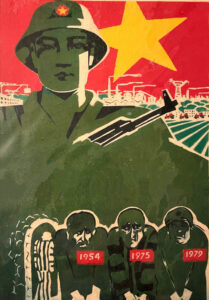
Mao Zedong was wont to refer to his political opponents, particularly the United States, as paper tigers.
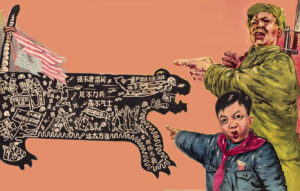
The term refers to something or someone that claims or appears to be powerful or threatening but is actually ineffectual and unable to withstand challenge. By repulsing the Chinese and excising their Khmer Rouge clients, the Vietnamese military would demonstrate that the Chinese, like us, were as much paper tigers themselves.
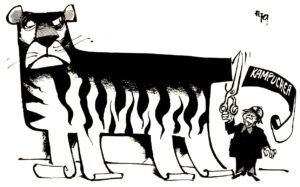
I sent the Minister a message via telegraph after I returned to campus. I worded it according to telegram protocol in the following way, ‘I appreciated your willingness to debate the war against Vietnam stop I pray you can bring it to a rapid end stop corralling villagers stop further killing stop our involvement.’
The Sum of all Fears.
‘. . . The enemy’s an age. The nuclear age. It happens to have killed man’s faith in his ability to influence what happens to him. And out of this comes a sickness, and out of sickness a frustration, a feeling of impotence, helplessness, weakness. And from this, this desperation, we look for a champion in red, white, and blue. Every now and then a man on a white horse rides by, and we appoint him to be our personal god for the duration. For some men it was a Senator McCarthy, for others it was a General Walker, and now it’s a General Scott.’
President Lyman in ‘Seven Days In May.
Let us never negotiate out of fear. But let us never fear to negotiate.
John F Kennedy
‘With the end of the Second World War the burning issue became that of the spread of atomic weapons. Writers such as Pearl Buck used their pen to warn of the new dangers. Her novel ‘Command the Morning’ is about scientists working on the atomic bomb. It is a protest against the use of nuclear weapons.
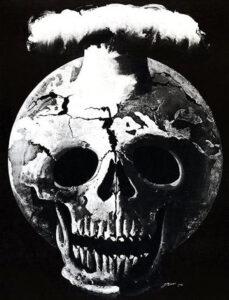
Revealing as usual the reality behind the American dream, Burt Lancaster used his acting craft to help posit how far the ante is upped when they end up not in civilian hands but in those of of warlike wingnuts. I told him he had helped reveal for me in ‘Seven Days In May’ the fragility of the democratic process, showing the military not as the usual buffoons, but as ruthless, hairy chested, gung ho right-wingers with a political agenda. Unlike the satirical ‘Dr. Strangelove’, this story about a runaway American military setting off war with the Soviet Union approaches the subject from the straight end.
Far fetched?. Kennedy who had read the novel and believed the worst case scenario it described could actually occur in the United States approved of filming outside the White House. Coming right after his assassination for reasons that still remain murky, it kept me on the edge of my seat, packing a grim warning about the military’s potential abuse of power. Acting the part of the calm and calculating, steely-eyed military hawk General Scott, Burt, fearing a Soviet sneak attack, pecks away at the president’s plan to end the cold war with a bold nuclear disarmament plan. He sees his treaty with Russia paring down stockpiles as an act of “criminal negligence”, amounting to a willing surrender to the enemy, and swathed in the flag, thundering away about protecting the country, rakes ‘one-worlders, intellectual dilettantes,” and those who believe that “patriotism is old-fashioned, ’ that “love of country is out-dated”, over the coals. From his last refuge this scoundrel marshals military support for a homegrown coup d’etat, plotting to overthrow the American government, believing that the only way to save the Constitution is by degrading and destroying it.
Far fetched? This would be the real life scenario for the 2021 insurrection plot instigated by the President himself.
In the film the stage was set for a political confrontation between the President’s supporters, who felt they must back him whatever their private apprehensions, and his opponents, who feared he was selling the country out. This scenario is said to have been influenced by the right-wing anti-Communist political activities of General Edwin A. Walker after he resigned from the military and by the clash between General Curtis LeMay and President Kennedy during the 1962 Cuban Missile Crisis.
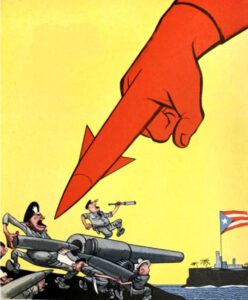
‘Iron Ass’ LeMay, the Air Force Chief of Staff, believed the naval blockade of Cuba Kennedy deployed wouldn’t be sufficient action and that the Soviet missile sites themselves should be bombed.‘
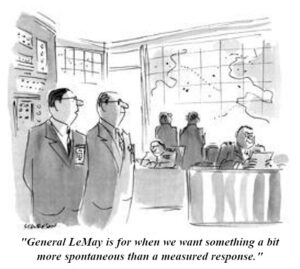
He had demonstrated this approach in Korea. His strategy was to ‘knock the shit out of ‘ the adversary before they could take action. He had demonstrated this approach in Korea.
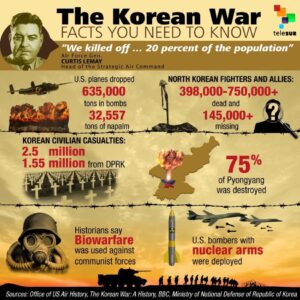
LeMay left this remark to posterity: ‘There are no innocent civilians, so it doesn’t bother me so much to be killing innocent bystanders.’
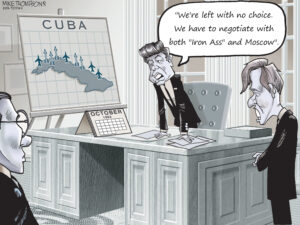
Sentiments such as LeMay’s prevailed in the so called ‘War On Terror’ to justify the attack on Iraq.
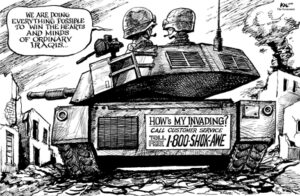
A lot of people are prepared to sacrifice constitutional liberties for the sake of ‘security’.
During the mad reign of Trump surrounded by his circle of generals one is forced to look to them for signs of sanity. With the Vietnam War, initiated by civilians, the military, on the whole not known for their military restraint was at first a little reluctant, then entered it and became corrupted by it, creating atrocity-producing situations. It’s a strange world, to say the least, when the generals are there to restrain the civilian.
Senator Fulbright would have been seen by Scott as one of these dewy-eyed dovish one worlders. I thanked the senator for raising the vital question of disarmament in the political arena. He saw the need for international control of nuclear weapons through the UN: “I for one would rather adopt a new idea in politics than spend the remainder of my days in the subterranean recesses of the earth”.
The unleashed power of the atom has changed everything save our modes of thinking and we thus drift toward unparalleled catastrophe.
Einstein in a telegram to prominent Americans, 24 May 1946.
Across the Atlantic this was the same target as that of Leonard Cheshire, who was entering the skies on a different kind of mission at the same time as Fulbright was visiting wartime England. Leonard became a member of the Campaign for Nuclear Disarmament, a coalition of social groups, peace groups, trades unions and individuals organizing the observance of the dropping of the atomic bombs. He called on all people to call for an end to nuclear weapons and tests.
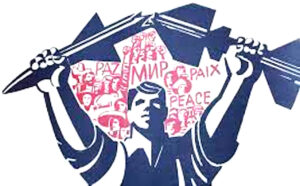
Leonard lectured on conflict resolution and took an interest in the outstanding conflict of the post war world. He would have been very disappointed that a former member of CND, one Tony Blair, would commit Britain to a renewed maintenance of nuclear weaponry, years after the caving in of the Soviet Union and in the absence any potential nuclear adversary. Abolition of such weapons would have sent a strong message to countries such as Iran not to play out their economic and social resources in matching the might of the West.
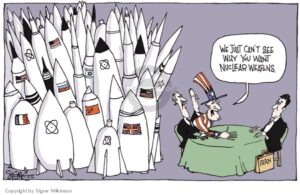
Before the collapse he arranged for Soviet scrapped missiles to be made into pens. He said ‘the pen is mightier than the sword and it is one item that is used throughout the world”.
Regrettably decades after the adoption of the Universal Declaration of Human Rights, many leaders still prefer to wield the blade.
